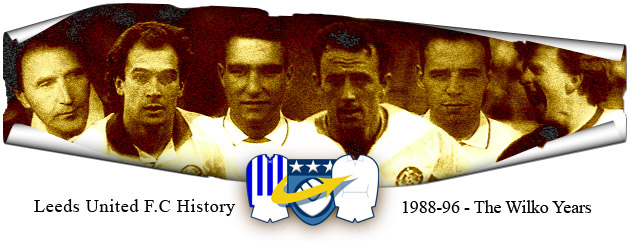
The Wilko Years: 1988-96
| 1988-89: |
Leeds Stats: Season Statistics: Games, Results, Appearances, Goalscorers and Teamsheets Season Statistics: Games, Results, Appearances, Goalscorers Football League Tables for the Season |
Howard Wilkinson’s arrival was a total surprise as Leeds were next to the bottom of the Second Division, while Sheffield Wednesday were in the top half of the First Division. To lure a Manager of Wilkinson’s undoubted ability on a four year contract was a major coup for the club.
As a player, the tall gangling Right-Winger Wilkinson failed as an amateur with Sheffield United, but after joining cross-city rivals Sheffield Wednesday in June 1962, he attained England Youth honours. He made 22 league appearances for the Owls in four years before he left for Brighton. In six years with the Seagulls he managed over 100 appearances but hit few headlines. 1971 saw him join Boston United as player-coach and later became player-manager. He gained a degree in physical education at Sheffield University, taught for two years and also became FA regional coach for the Sheffield area. His coaching ability was well respected and after being Manager of the England semi-professional side he was elevated to England under-21 manager in November 1982. In January 1980 he was appointed coach at Notts County and eventually replaced Jimmy Sirrell as Manager, playing a big part in the club’s promotion to the First Division in 1980-81. Bigger clubs had taken notice of Wilkinson’s ability and in June 1983, he succeeded Jack Charlton as Sheffield Wednesday’s Manager. He was an instant success, taking Wednesday back to the First Division in his first season and piloted them to the upper echelons in both the League and Cups. However, he felt he had taken Wednesday as far as possible given the club’s reluctance to back him financially.
Wilkinson was well known for his attention to detail, organisational skill, tactical know-how and his hunger to turn his players into the best physical shape possible, which soon became apparent in his new position. He won few friends by ordering the removal of all the mementoes of past glories from the rooms and corridors of Elland Road. Norman Hunter was axed from the coaching staff as Wilkinson brought in Mick Hennigan, his former Brighton team-mate and Sheffield Wednesday coach.
He was soon into the transfer market, signing midfielder Andy Williams from Rotherham United for £170,000, while Mike Whitlow and Neil Parsley were picked up for £30,000 from Witton Albion. His liking and trust of his former players became apparent when he went to Bristol City and paid £50,000 to pick up ex-Wednesday striker Carl Shutt, with the promising Bob Taylor leaving in the opposite direction for £200,000. Shutty became an instant hero, scoring a hat-trick on debut in a 3-0 home win over Bournemouth.
Mickey Adams was sold to Southampton for £250,000, Peter Swan went to Hull City for £200,000 and Jack Ashurst and Vince Brockie both departed for Doncaster Rovers for £10,000 and £15,000 respectively.
When Wilkinson arrived United were a precarious 23rd in a 24 team competition with just 6 points to show for their 9 games played. They duly won his first game 3-1 against Peterborough United to progress to the 3rd Round of the League Cup. Three consecutive draws were achieved before the first League victory of his reign came, 2-1 over Hull City at Elland Road, before Luton Town came to Leeds and left with a 2-0 victory and eliminated United from the League Cup. After a 3-1 home victory over Shrewsbury Town in the Simod Cup, another visit to The Den saw Millwall again end United’s aspirations 2-0 in the Second Round.
Cup glory was not a pre-requisite and after Ian Baird’s brace allowed United to win 2-1 at Brighton in the FA Cup Third Round, it came as little surprise that high-flying Nottingham Forest achieved the expected, triumphing 2-0 at the City Ground in the 4th Round.
League survival was the priority and a steady accumulation of points saw United safe long before the season’s end. Wilko now started to look to the future and began his team-building in earnest by signing Scottish International midfielder Gordon Strachan from Manchester United for £300,000 and classy Tottenham England under-21 defender Chris Fairclough came on loan to the end of the season when his move was made permanent in exchange for a £500,000 cheque. Strachan, who was a model professional, proved to be a bargain and just as in the Revie years, with the ‘Little General’ Bobby Collins, the diminutive Scot became a real bargain and inspirational leader on which success was built.
Wilko achieved a healthy 10th position on 69 points, with Bobby Davison leading the scorers with 14, followed by Ian Baird with 10, and he sat down with the board in a position of strength when he argued for their financial backing, so that promotion could be achieved.
| 1989-90: |
Leeds Stats: Season Statistics: Games, Results, Appearances, Goalscorers and Teamsheets Season Statistics: Games, Results, Appearances, Goalscorers Football League Tables for the Season |
The Directors backed Wilko, and his spending spree initially left the club £2 million in debt.
Republic of Ireland International John Sheridan, who had been the inspiration for United for several seasons, was allowed to go to Nottingham Forest for £650,000. Former Skipper Mark Aizlewood, who had been stripped of the captaincy and banned for 14 days for making rude gestures to the crowd when they barracked him, not surprisingly left the club to join Bradford City for £200,000 and the same amount took defenders Neil Aspin to Port Vale and David Rennie to Bristol City. John Stiles left for Doncaster Rovers for £40,000, as did Kevin Noteman for £10,000 and there were free transfers for Peter Mumby to Burnley, Ronnie Sinclair to Bristol City and Gary Williams to Watford.
The sum of those transfers put around £1.5million into the United coffers, but was well exceeded as Wilko set about assembling a side capable of gaining promotion.
Wilkinson embarked on an almost £3 million spending spree to buy players who would be experienced and able to stand up to the rigours of a 46 match campaign. His first choice was Vinnie Jones, Wimbledon midfield ‘hard man’ and possessor of a disciplinary record which had earned him the nickname ’Psycho’, who was bought for £600,000. Immensely popular with fans, he was willing to sweat blood for the cause which made up for his lack of some of the game’s finer skills. Attacking Winger John Hendrie had long been coveted by United and £500,000 bought him from Newcastle United. Seasoned Internationals were also bought. Ex Sheffield Wednesday Right-Back Mel Sterland, cost £600,000 from Glasgow Rangers, Irish International Defender John McClelland cost £100,000 from Watford and much-travelled Welsh International Winger Mickey Thomas, £10,000 from Shrewsbury Town, while Irish International Left-Back Jim Beglin, whose career was cut short by injury, came on a free transfer from Liverpool.
The United fans showed their enthusiasm with a big stampede for Season Tickets, £820,000 being sold as the season kicked off with high expectations with a visit to expected promotion rivals Newcastle United. With Jones and Fairclough unavailable due to injuries, Day; Sterland, Beglin; Thomas, McClelland, Haddock; Strachan, Batty, Baird, Davison and Hendrie took the field, with Whitlow and Shutt coming from the bench to replace Thomas and Davison. Bobby Davison and Ian Baird gave United a 2-1 lead after 30 minutes but a dire defensive performance saw Leeds routed 5-2.
The visit of Middlesbrough required a freak last minute own goal for United to scrape home 2-1. A run of successive 1-1 draws at home to Blackburn Rovers and Ipswich Town and away at Stoke City reminded United it was not going to be a cakewalk, before an 11 game undefeated run including 9 victories saw United well up with the leaders, and a 2-0 win at Middlesbrough in early December saw United proudly in first place.
Ian Baird left United for Middlesbrough in exchange for £500,000 after another ex-Sheffield Wednesday player, Lee Chapman, was a £400,000 signing from Nottingham Forest in January. Chapman was soon followed by a further Sheffield Wednesday striker Imre Varadi who cost £50,000 for his switch from Hillsborough and Stoke utility player Chris Kamara was picked up for £150,000 with Noel Blake going in the opposite direction for £150,000. He joined Winger Vince Hilaire, who was already at Stoke City on loan. The arrival of Chapman and Kamara proved to be the final pieces in the promotion jigsaw for United, as a three way battle developed between the three Uniteds of Leeds, Sheffield and Newcastle for the two promotion places.
There had been quick exits from the Cups. Oldham Athletic winning both Second Round Legs 2-1 to eliminate United from the League Cup. The Simod Cup had been renamed the Zenith Data System Cup and United soon progressed 1-0 in the First Round past Blackburn Rovers at Elland Road. A 2-1 win at Barnsley saw a Third Round tie at Stoke City, where United went through on penalties after a 2-2 draw. Further progress was halted by Aston Villa, who won their 4th Round home tie 2-0. The FA Cup brought a 1-0 home defeat to Ipswich Town in the Third Round.
With no distractions Leeds were able to concentrate on the Second Division title race and despite a few signs of title nerves United got their act back together for the Easter Monday local derby with championship rivals Sheffield United. In front of a 32,727 crowd they blew the opposition away 4-0, with two goals from Gordon Strachan, one from Lee Chapman, and another from the young Gary Speed who had emerged from the junior ranks to keep John Hendrie out of the team. Speed was on the mark again at Brighton where a late own goal gave United a 2-2 draw. United’s strength had been the way they dominated sides at Elland Road and so it came as a total surprise when Barnsley became the first team to beat United on home territory with a 2-1 win. This left United needing to win both their remaining matches to be sure of promotion.
32,597 crammed Elland Road for the visit of Leicester City, who had, earlier in the season, brought to an end a fine United unbeaten run by winning 4-3 at Filbert Street. Mel Sterland thumped United into the lead early in the game. The second goal just would not come and there was despair when Gary McAllister scored with a spectacular long range shot to make the scores level, but, with nerves of the crowd showing, Gordon Strachan got his 16th League, and 18th overall, goal of the season to send the fans home in raptures with a 2-1 victory. The win did not ensure promotion, but left United in the box seat, as a win at relegation-threatened Bournemouth would bring not only promotion but also the championship. Sheffield United, who visited Leicester City,and Newcastle United, who had to visit relegation candidates Middlesbrough, were both ready to pounce.
The two latest Leeds recruits combined as Chris Kamara crossed for Lee Chapman to rise and head the winner, and United had little difficulty in hanging on to their lead to win the championship with 85 points, on goal difference from Sheffield United who won at Leicester City. Ian Baird scored twice to help United, and, while ensuring Middlesbrough’s safety from relegation and Newcastle United’s failure to gain promotion, he also guaranteed himself a Second Division Championship medal from his old club.
There was a blot on the otherwise perfect day, when there were ugly clashes between police and Leeds fans that had turned up without tickets. Tiny Dean Court held 10,000. United were allocated 2,200 tickets, but an estimated 5,500 made the most of a Bank Holiday weekend to try and watch the South Coast fixture, which resulted in 120 arrests over the weekend.
Wilkinson had assembled a team with tremendous character and all played their part, leading the promotion race virtually non-stop since Christmas. Ever-present Skipper Gordon Strachan, even at 34, took most of the plaudits and was recalled to the International arena by Scotland. He led the scores with 16 in the league, followed by 12 in 21 games from Lee Chapman and 10 in 25 by Bobby Davison. There were 44 appearances in goal for the ever-reliable Mervyn Day, 43 (+2 Sub) from the irrepressible Vinnie Jones, 42 from Chris Fairclough, 41(1) from Mel Sterland, and 40 from Peter Haddock in a stable reliable defence, while David Batty continued to produce outstanding performances in midfield with 39(3). The Left-Back position had caused problems as several different players seemed to catch the injury jinx, but Wilkinson was already making plans for the new season once more back in the top flight.
| 1990-91: |
Leeds Stats: Season Statistics: Games, Results, Appearances, Goalscorers and Teamsheets Season Statistics: Games, Results, Appearances, Goalscorers Football League Tables for the Season |
Wilkinson brought his spending to £6 million since taking over from Billy Bremner, when he splashed close to £2.5 million on three players in preparation for the return to the elite. First he bought John Lukic back from Arsenal for United to break the £1 million barrier for the first time, but it didn’t take long before Gary McAllister was bought from Leicester City to double the millionaire’s club, while West Bromwich Albion defender Chris Whyte joined for £450,000, a fee set by the FA Tribunal.
The signings meant that the dependable Mervyn Day would lose his spot between the posts and a serious cloud was placed over the future of the inspirational Vinnie Jones and solid reliable defender Peter Haddock, but each purchase was seen as improving the quality of the team.
Now playing second fiddle to Gary Speed, John Hendrie joined Ian Baird at Middlesbrough for £550,000 and there were free transfers for ex-Skipper Brendan Ormsby, who joined Doncaster Rovers, Chris O’Donnell to Exeter City, and Mickey Thomas to Stoke City, who also took Vince Hilaire following his loan spell.
The return to the top flight saw a first day away trip to Goodison Park to meet Everton and United started in a fashion which was going to become their accepted modus operandi, they roared onto the attack with the intention of blowing the opposition away in the first 20 minutes. They were 3-0 up by half-time with goals from Chris Fairclough, Gary Speed and ImreVaradi, before a second half revival from Everton saw United hang on for a 3-2 victory, with John Lukic fully justifying his fee. The starting eleven was, Lukic; Sterland, Snodin; Batty, Fairclough, Whyte; Strachan, Varadi, Chapman, McAllister and Speed, with Kamara and Haddock coming from the bench to replace Varadi and Speed. Haddock replaced Snodin at left-back for the first home game, which saw a visit from Manchester United, who were fortunate to hold on for a boring 0-0 draw.
Glynn Snodin was back in place of Peter Haddock for the next home game which saw a resounding 3-0 victory over Norwich City, with two goals from Chapman and one from Viradi. Vinnie Jones made his only United appearance in the top flight in the 1-0 away loss to lowly Luton Town. This was followed by a 2-0 home defeat to Tottenham Hotspur, which served to remind United that life was not going to be easy in the First Division. It came as no surprise when Vinnie Jones joined former Wimbledon Manager Dave Bassett, for £650,000, at Sheffield United. By a quirk of fate Leeds were the next visitors to Bramall Lane, and while his first appearance was well received by both sets of fans, Leeds went away with the three points with goals from Pearson and Strachan without reply. Leeds were winning many new fans with their new exciting brand of attacking football and a great run in November and December saw them arrive at Anfield on New Years Day full of confidence, but they were outplayed by a fine Liverpool team, who eventually finished runners-up, to lose 3-0.
There was a three-pronged assault on the Cups, which brought fixture congestion, and did not aid United’s championship bid. The League Cup saw a 1-0 defeat at Leicester in the opening Second Round Leg, but United easily progressed with a 3-0 win in the home leg. The Cup bogey of old rivals Oldham Athletic was laid to rest 2-0 at Elland Road in Round 3, followed by a 3-0 thrashing of Queens Park Rangers at Loftus Road , to set up a Fifth Round home-tie with Aston Villa. A 4-1 victory saw the prospect of a two legged semi-final with Manchester United. Unfortunately there was a 2-1 loss at Old Trafford and United were unable to break down the resolute Manchester defence in the home leg, and insult was added to injury when Lee Sharpe scored a break-away winner to end the dreams of a visit to Wembley.
The ZDS Cup started with a Second Round 2-1 away win at Wolverhampton Wanderers and a 2-1 Third Round home victory against Derby County had United thinking this could be an alternate way to reach Wembley. Hopes rose even further when Manchester City were beaten 2-1 in the Northern Semi-Final to set up a two-legged tie with Everton in the Northern Final for the right to meet the Southern Winners in the Grand Final at Wembley. The Fixtures were so congested that United travelled to Highbury, running fourth in the league to meet top-dogs Arsenal on the Sunday, which they lost 2-0, and then drew 3-3 at home on the Tuesday but were beaten 3-1 at Goodison on the Thursday, and another Cup dream came to an end.
There was a 1-1 draw at Barnsley in the Third Round of the FA Cup but United easily went through in the replay 4-0. This set up a titanic struggle with eventual Champions Arsenal in the Fourth Round. United surprisingly held the Gunners 0-0 at Highbury and three days later there was a 1-1 draw after extra-time in the replay at Elland Road. There was another 0-0 draw after extra-time at Highbury and three days after that Elland Road saw Arsenal finally triumphant 2-1 after seven hours of extremely high quality football.
United could have been forgiven if they had settled for mid-table respectability after such an hard season but it was to their credit that they battled all the odds to finish fourth on 64 points, with some tremendous efforts.
Probably the best remembered guts-effort saw Championship-chasers Liverpool arrive at Elland Road in April and play United off the park to be 4-0 up at half time. In a never to be forgotten second half Lee Chapman pulled a goal back and then Carl Shutt reduced the deficit further. This only served to stir Liverpool to reply with a brilliant John Barnes goal, to make the score 5-2. Lee Chapman had been causing total panic in the Liverpool defence every time a high ball was crossed, and United used this ploy mercilessly. Lee responded magnificently scoring twice more to claim a deserved hat-trick and have Liverpool hanging on for grim death at 5-4, when both teams left the pitch to thunderous applause from a near capacity 31,460. He could have had four and the magical draw achieved but the referee disallowed what appeared to be a perfectly good goal for an infringement on the keeper.
Chapman had a stellar season and after scoring twice in a last day 4-3 loss to Nottingham Forest to finished the top scorer in the First Division with 21 league goals and 31 in all.
Remarkably Lukic, Sterland, Whyte, Chapman and McAllister had all played the maximum 38 League games, with Batty 37, Speed 35, and Strachan and Fairclough both on 34. The Leeds Midfield of, Strachan, Batty, McAllister and Speed, was acknowledged as the finest in the league. There was an England ‘B’ cap for Chapman, Lukic and Sterland, whilst David Batty gained full honours with England, Gary Speed was capped by Wales,Gordon Strachan captained Scotland, and was a regular with team-mate Gary McAllister. To cap everything Strachan followed in the footsteps of Bobby Collins, Jack Charlton and Billy Bremner to be elected Footballer of the Year.
| 1991-92: |
Leeds Stats: Season Statistics: Games, Results, Appearances, Goalscorers and Teamsheets Season Statistics: Games, Results, Appearances, Goalscorers Football League Tables for the Season |
Leeds had lost £3 million in achieving their Second Division Championship. A further £2.5 million had been lost in their first season in the top flight. Still the Director’s again backed Wilkinson’s judgement and allowed him to spend a new record £1.6 million for Southampton’s England Under-21 International striker Rod Wallace, who was accompanied by his younger twin brother, Full-Back Ray, who cost £100,000. Classy Australian-born English international Left-Back, Tony Dorigo, was signed from Chelsea for £1.3 million to solve United’s problem position. Experienced England International Midfielder Steve Hodge came from Nottingham Forest for £900,000 while Wilkinson again returned to Hillsborough to pick up two promising young Sheffield Wednesday defenders, David Wetherall and Jon Newsome for a bargain combined fee of £275,000. With 20,000 Season Tickets sold, bringing in £3.5 million and the prospect of high TV and broadcasting income, the Board felt it well worthwhile in their strife to bring the title to Elland Road.
Peter Haddock had not been able to overcome the injury sustained in the home League Cup Semi-Final against Manchester United in February and along with the unlucky Jim Beglin took the Insurance cheque and retired. John Pearson, who had only managed a supporting role, was sold to Barnsley for £135,000. After a short loan spell Reserve keeper Neil Edwards joined Stockport County for £5,000 and was later to play three times for them at Wembley.
Such was the size of the Leeds squad that during the season, Glynn Snodin was loaned to Oldham Athletic and Rotherham United, Dylan Kerr had spells at Doncaster Rovers and Blackpool, Bobby Davison had spells with Derby County and Sheffield United, Mervyn Day with Luton Town and Sheffield United, while Andy Williams, Imre Varadi and Ray Wallace were loaned to Port Vale, Luton Town and Swansea City respectively. Later in the season Chris Kamara was allowed to leave for Luton Town for £150,000, Imre Varadi was freed to Rotherham United and Leicester City paid £250,000 and £50,000, respectively for Mike Whitlow and Simon Grayson.
There were big developments at Elland Road with extensions to the South-East corner of the stadium and the banqueting and reception area of the West Stand. Plans were also on the drawing board for the demolition of the Lowfield Road Stand and Terraces at the end of the present season. It was to be replaced with a 17,000 all-seater stand, which was to be the largest cantilever span in Europe. However, the start of United’s season was delayed, when there was no game on the opening day, when Crystal Palace had not finished their building work at Selhurst Park
After ten games Leeds and Manchester United remained the only unbeaten teams in the Division. Ironically Leeds lost the next game, the re-arranged fixture at Selhurst Park, and Manchester became firm favourites with 26 points from ten games, already six points ahead of Leeds who had played a game more.
Leeds responded well with two 4 goal hauls, 4-3 at home to Sheffield United and 4-2 at Notts County and a 1-0 home victory over Oldham Athletic saw them briefly head the League. A goalless draw at Wimbledon saw them fall back to second, but they again took the lead the following game, as Queens Park Rangers were beaten 2-0 at Elland Road.
The whole of the football world took notice when, in front of the TV cameras at Villa Park, Aston Villa were given a 4-1 football lesson, when they and the viewing public looked on in stunned amazement, as United maintained their leadership of the Division. They maintained that lead through November before a succession of draws saw it surrendered just prior to Christmas.
The weekend after the festive season, Manchester United arrived at Elland Road for the first of a triple of home fixtures, which saw them consecutive visitors in the League, League Cup and FA Cup.In the early season fixture at Old Trafford, Lee Chapman had quickly given his team the lead, only to see a last minute equaliser rob them of victory. This time it was Leeds who left it late as Mel Sterland converted a penalty to share the spoils, but Manchester still had the lead at the top of the Division.
There was a surprise on New Year’s Day, when Queens Park Rangers surprisingly rocked the boat 4-1 at Old Trafford and, with Leeds winning 3-1 at West Ham United; they were back in the lead. There was another treat for the viewing public as United won 6-1 over Sheffield Wednesday at Hillsborough in a live televised game. The game was sandwiched between two Cup losses to Manchester United. In the League Cup Gary Speed had given Leeds a first half lead but Manchester hit back to win 3-1. The FA Cup saw a rampant Leeds batter Manchester, who broke away from the siege for Giggs and Hughes combine to score just before half-time. Try as they might Leeds could not turn territorial advantage into goals and they were left to concentrate on the League, albeit without their star striker, Lee Chapman who had broken his wrist in the encounter.
Despite Chapman’s absence Leeds hung on to their leadership, by goals mainly from defenders. His absence prompted Wilkinson to scout around for a capable deputy, taking Tony Agana on loan from Notts County and gambling on loaning the precocious talents of "l’enfant terrible" Frenchman Eric Cantona, who’s presence was not initially successful as, in his first substitute appearance, Oldham Athletic defeated United 2-0 at Boundary Park to knock United off the top pedestal.
After missing 4 games, Chapman did return for the home game with Luton Town, and he and Cantona netting in a 2-0 victory. Two games later a 3-1 win at Tottenham Hotspur saw United back on top. Despite a mid-week reversal, 4-1 at Queens Park Rangers, they still remained top and a Chapman hat-trick, and goals from Cantona and Wallace, saw Wimbledon thrashed 5-1 at Elland Road. So with eight games remaining, they led by two points, but Manchester had three games in hand and were clear favourites.
Draws at Arsenal and at home to West Ham United followed by a 4-0 drubbing by Manchester City saw Leeds fall to second spot. They roared back with a 3-0 home victory over Chelsea, with Cantona treating the United faithful to a display of his unique ball wizardry as he juggled the ball past several defenders before scoring one of the best goals ever seen at Elland Road. The following week, a draw by Leeds at Anfield saw Manchester regain the ascendency. Fortunately they had started to fritter away their games in hand and now led Leeds by two points and one game in hand, while having only three games left to play. Fortuitously, Nottingham Forest reversed their Wembley League Cup Final result to unexpectedly win 2-1 at Old Trafford, and with Leeds beating Coventry City 2-0 at home in a late kick-off, they again took the championship lead.
Manchester wasted their game in hand when beaten 1-0 by bottom of the table West Ham United and Leeds now had destiny in their own hands. If they won their remaining games at Sheffield United and at home to Norwich City the championship was theirs, falter and Manchester, who had to visit Liverpool at Anfield before finishing at home to Tottenham Hotspur, or the fast finishing Sheffield Wednesday could claim English Football’s major prize.
Wednesday put themselves out of the equation, when they could only draw at Crystal Palace on the Saturday. So it was left to the Sunday televised double-header to point the way to the final outcome in the battle between the United’s of Leeds and Manchester.
The game at Bramall Lane was given the early kick-off and Leeds fell behind to an Alan Cork goal, but the gods shone on them as they scored a freakish equaliser just on half-time. The ball ricocheted around like a pinball from a Sheffield clearance onto Gary Speed and then Rod Wallace and United could not believe their luck when it finished in the net.
The Sheffield keeper was injured in the incident and was still clearly hampered as Gary McAllister delivered a free kick from the touchline and the young Jon Newsome, deputising at Right-Back for the injured Mel Sterland, dived headlong at the far post to give Leeds the lead. Unbelievably, there was another bizarre equalizing goal, this time Leeds striker Lee Chapman deflected the ball into the net from Sheffield defender John Pemberton’s cross. Unfortunately it was into his own, rather than opposition’s, goal!
The game, and the title, was decided by an equally weird happening. Another defensive blunder saw the still hampered Sheffield keeper, Mel Rees, advance to cut off a Leeds attack only for his Central Defender, Bryan Gayle, who was unaware of his advance, to head it over him and it bounced several times before it beat the pursuing Cantona and Wallace into the net.
The 3-2 win meant Manchester had to win at Anfield to keep their hopes alive. An early Ian Rush strike and a late Mark Walters goal ensured a 2-0 defeat and many thousands of Leeds fans all over the world were jubilant as they reclaimed the championship after 18 years to become the final winners of the Football League Division One as the country’s top League, as it became the English Premier League in 1992-93.
The City of Leeds feted their heroes and the final game took on a festival atmosphere as a Rod Wallace wonder goal saw United victorious to finish clear top with 82 points and only four defeats, all away from fortress Elland Road.
John Lukic appeared in all 42 games, as did Gary McAllister, although he came on from the substitute’s bench and scored at Notts County. Gary Speed and Chris Whyte both had 41 appearances, David Batty 40, Lee Chapman and Tony Dorigo 38, Gordon Strachan 35, Rod Wallace 34, Chris Fairclough 30 and Mel Sterland 29. Lee Chapman led the scorers with 16 and Rod Wallace notched 11, but there were seven very important goals from Steve Hodge often coming from the bench to score when vitally needed.
The League Cup started with a 0-0 draw away and a 3-0 home victory in the two-legged Second Round against Scunthorpe United, followed by a 3-1 home win over Tranmere Rovers in the Third Round and a 4-1 victory at Goodison Park over Everton, before falling to eventual winners Manchester United in the Fifth. One could be forgiven for thinking that Wilkinson did not take the ZDS Cup seriously, as an under-strength team lost 3-1 at home to Nottingham Forest in the Second Round. There was an early exit to Manchester United in Round Three of the FA Cup. Who is to say that those two Cup defeats did not play a large part in the Championship’s final destination, of Leeds, as the extra games seemed to take their toll on the team from Manchester? Maybe a case of he who laughs last, laughs best. However taking into account the events of the following decade and more, one might justifiably make the same comment, but at that moment, winners were grinners and the rest could please themselves!
| 1992-93: |
Leeds Stats: Season Statistics: Games, Results, Appearances, Goalscorers and Teamsheets Season Statistics: Games, Results, Appearances, Goalscorers Football League Tables for the Season |
With the qualification for the European Cup, Wilkinson had finalised the purchase of Cantona from Nantes for £900,000. He now took into account the extra games likely to ensue, and likelihood that 35 year-old Gordon Strachan might not always be available, and splashed a new club record £2 million for the Arsenal England International David Rocastle. He quickly followed this up with the £800,000 return signing of former Leeds player Scott Sellars from Blackburn Rovers. Players leaving were Glynn Snodin, who had joined Heart of Midlothian on a free and Bobby Davison, who was sold to Leicester City for £50,000.
United tuned up for the new season and their defence of their title and assault on Europe with a magnificent 4-3 Charity Shield victory over Liverpool at Wembley, in which Cantona scored a hat-trick, in a scintillating display of all that is finest in the English game.
Two Lee Chapman goals gave United a streaky win over Wimbledon, 2-1 at Elland Road, in a game which both teams struggled to come to grips with the new back-pass rule. This was followed by a 1-1 away draw at Aston Villa , but the visit to newly promoted Middlesbrough had the alarm bells ringing as United were humbled 4-1, with Cantona getting his first League goal of the season.
A Cantona hat-trick saw Tottenham Hotspur put to the sword 5-0 at Elland Road, and it seemed the season was back on even keel. A 2-2 draw at home to Liverpool, was followed by another 2-2 draw at Oldham Athletic where there was a brace from Cantona, which turned out to be his final goals in the league for Leeds. This was only the prelude to a 2-0 defeat at Old Trafford and United were struggling with only nine points from seven games. Further 1-1 draws at home to Aston Villa and at Southampton saw them drop even further to 14th position.
A worrying pattern was emerging, as after a 2-0 home win against Everton, United lost away again, this time 4-2 to Ipswich Town. United were now well out of contention in 10th spot and any thoughts of them retaining their championship were pipe-dreams. They won their next home game 3-1 against Sheffield United, but the away blues struck again as they met another defeat, 2-1 at Queens Park Rangers. A home draw, 2-2, with Coventry City was followed by another 4-0 drubbing from Manchester City at Maine Road, which proved to be Cantona’s final league game for United.
There had been persistent rumours surrounding Cantona and his uneasy relationships with Wilkinson and some team-mates. He was extremely popular with the fans and had had a hit tune of Ooh! Ah! Cantona!, in his honour, but when Alex Ferguson asked about his availability, he was answered in the affirmative and he crossed the Pennines to Old Trafford for £1.2 million.
There was an outcry from the fans. It was probably justifiably so, as it was his genius and creativity that piloted Manchester to the championship. The following season he was named PFA Player of the Year and he would inspire and captain them to three further league titles, including two doubles, and gain the Player of the Year Trophy in the ensuing four years, while Leeds fans pondered on what might have been.
A 3-0 home victory over Arsenal temporarily soothed the fans displeasure, but a 1-0 defeat at Chelsea was followed by a 4-1 home humbling at the hands of bottom-of-the-table Nottingham Forest and, even though they managed a 3-1 home win over Sheffield Wednesday the following weekend, a 1-0 defeat at Crystal Palace took them into Christmas in 14th spot on 24 points. A 3-1 defeat at Blackburn Rovers and a goalless home draw with Norwich City saw them slip to 17th as a New Year arrived.
The home record held firm as a win over Southampton was interspersed with an away defeat at Everton and Wilkinson paid IK Start £250,000 for the young Norwegian International, Frank Strandli, who scored on debut in a 3-0 revenge home win over Middlesbrough. His success was short-lived as he fell from favour with Leeds and internationally, when he failed to settle in England and returned to his homeland at season’s end.
The European Cup had seen Leeds face Vfb Stuttgart, the German Champions, in Round One and all appeared fine in the opening away leg until the hour mark, when United seemed to lose concentration and finished 3-0 down. The return at Elland Road saw Leeds play their best game of the season and rip into the Germans from the off. Gary Speed gave United the required early goal, but as they threw caution to the wind a Stuttgart breakaway saw the visitors’ level the scores and United were back to square one and had conceded the vital away goal. United refused to give in and were immediately back in front on the night as McAllister netted from the spot. Cantona reduced the overall deficit to one, midway through the second half. Lee Chapman, who had given the Stuttgart German International stopper Buchwald a torrid evening, headed the goal which levelled the aggregate with 10 minutes to go. The Stuttgart Coach threw on several defenders to try to bolster his leaking defence, and in so doing he stopped United from getting the winner despite all their efforts, and it appeared Stuttgart had survived on the away goal rule. Unfortunately for him, in his desperation, he had broken the ‘foreign player rule’ and UEFA ruled that Leeds had won the tie 3-0, and so it was off to Barcelona’s Nou Camp Stadium for a neutral play-off. Predictably a meagre crowd witnessed the famous Leeds victory with substitute Carl Shutt getting the decider in the 76th minute almost with his first kick of the game.
That set up the ‘Battle of Britain’ with Scottish champions Glasgow Rangers, who had one of their best-ever teams. Gary McAllister stunned Ibrox with a first-minute volley, but Rangers came straight back and John Lukic lost the flight of a corner and punched the ball into his own net. Ally McCoist gave the home team the lead, 2-1, just before half-time. So it stayed until full-time, but Mark Hateley hammered a peach of a goal in the third minute of the Elland Road leg to virtually seal the tie. McCoist added another in the second half with Cantona getting a consolation, as Rangers cruised through 4-2 on aggregate.
In the League Cup there was a 4-1 home victory over Scunthorpe United, but United could only draw 2-2 in the away leg as they won through to meet Watford away in the Third Round. Cantona played his last-ever game for Leeds, as they were beaten 2-1.
With the FA Cup being United’s last surviving chance of glory for the season, they were disappointed to only draw 1-1 at home to Charlton Athletic, who were a mid-table Division One outfit. Fortunately they added to their Nou Camp ‘foreign soil’ victory with the addition of a 3-1 away FA Cup victory. This brought another FA Cup meeting with Arsenal. After holding them to a 2-2 draw at Highbury, and seeming to have the game in the bag at Elland Road, they fell 3-2 after extra time.
Now, with only the League to worry about, they continued their roller-coaster form with a 1-0 defeat at Wimbledon, a 0-0 draw with Manchester United and a 2-0 win over Oldham Athletic at home, before a 4-0 thumping at Tottenham Hotspur and a goalless draw at Highbury. Two lone goal home victories over Ipswich Town and Manchester City, followed by two 1-1 draws at Nottingham Forest and at home to Chelsea, eased their worries. This left them precariously placed in 16th position but with a reasonable cushion over the bottom four.
Wilkinson had made a late foray into the transfer market, selling Scott Sellars to Newcastle United for £700,000 and paid £500,000 for Swindon Town’s David Kerslake to fill the troublesome right-back spot vacated by the injured Mel Sterland, and gave him his debut in the home game against Manchester City. He also bought Mark Beeney from Brighton & Hove Albion for £350,000 as cover for John Lukic, whose form had become erratic.
Meanwhile the Juniors had been getting rave reviews, as Wilkinson’s youth policy began to bear fruit. With safety virtually assured, there were debuts for Beeney, and the youngsters, Bowman, Forrester, Sharp, Tinkler and Whelan as the season spluttered to a disappointing end, with United 17th on 51 points. Lee Chapman was the only goal-scorer to reach double figures with 13 in the league.
In a season which started on such a high and promised so much, United failed to win one game on their League travels, and but for their strong home record with only one defeat would surely have been relegated. There was, however, one shining light and reason for future optimism, the outstanding FA Youth Cup-winning Juniors.
Mark Tinkler, Jamie Forrester, Noel Whelan, Rob Bowman and Kevin Sharp were all members of the England Under-18 team that won the European Championship. Mark Ford and Andy Couzens also became England Internationals at junior level and all seven were to feature in United’s first team with varying degrees of success.
In a never-to-be-forgotten Youth Cup Final, United triumphed in both Legs. Noel Whelan and Jamie Forrester scored in a 2-0 upset at Old Trafford in front of 30,562 fans. While 31,037 saw the Elland Road leg, which saw a 2-1 win for Leeds. A spectacular overhead kick from Jamie Forrester gave Leeds the lead, but after a Paul Scholes equaliser from the spot, Matthew Smithard got the decider on the night, for an emphatic 4-1 aggregate win.
Leeds were represented by Pettinger; Couzens, Sharp; Tinkler, Daly, Bowman; Smithard, Ford, Whelan, Oliver and Forrester with substitute appearances for Tobin and Byrne for Bowman and Oliver at Elland Road. Manchester were represented by Whitmarsh; O’Kane, Riley; Casper, G.Neville, Gillespie; Butt, Beckham, Irving, Scholes and Thornley, with Savage substituting for Beckham at Old Trafford, while P. Neville replaced O’Kane, and Savage replaced Butt, with Murdoch substituted for Irving in the Elland Road encounter. For Manchester the brothers Neville, Scholes, Butt and Beckham all became regular full England Internationals, while Robbie Savage and Keith Gillespie attained the same status with Wales and Northern Ireland respectively. The five Englishmen went on to form the nucleus of the Manchester United success for years to come. While the majority of the young Leeds squad were to soon fade into oblivion, at the end of the 1992-93 season, they caused the future to look temporarily bright.
| 1993-94: |
Leeds Stats: Season Statistics: Games, Results, Appearances, Goalscorers and Teamsheets Season Statistics: Games, Results, Appearances, Goalscorers Football League Tables for the Season |
With Lee Chapman almost 34 and Gordon Strachan already 36, Wilkinson needed new blood and he paid a new record fee of £ 2.7 million to bring Leeds-born striker Brian Deane from Sheffield United, while Chapman took off for Portsmouth for £250,000. The vastly experienced Arsenal stopper, Irish International David O’Leary, also joined on a free transfer. He failed to make an impact as injuries blighted his short Leeds playing career. A young Gary Kelly was tried in the problem right-back spot and the speedy Irishman adapted so well that he was an ever-present and formed a solid full-back pairing with the classy Tony Dorigo. Probably, it was the best in the Division. His form was such that Wilkinson allowed David Kerslake to depart to Tottenham Hotspur for £450,000.
With Squad numbers used for the first time, United were off to a mediocre start with a draw at Manchester City and a 1-0 home win over West Ham United closely followed by a 4-0 home humbling from Norwich City and, with away defeats at Arsenal and Liverpool soon following, the alarm bells were ringing. A home win over Oldham Athletic was followed by their first away win in the League, since their championship winning victory at Sheffield United, by 2-0 at Southampton. There was another home win over Sheffield United and then their relegation worries were banished with further victories, 2-0 at Coventry City and 4-0 at home to Wimbledon, as they moved into third spot and there were now thoughts of a championship challenge.
A 0-0 draw at Ipswich Town was followed by two 3-3 draws at home to Blackburn Rovers and away at Sheffield Wednesday and saw the challenge maintained. However, after featuring as a substitute against them, David Batty was surprisingly sold to Blackburn Rovers for a record £2.75 million. The fans were understandably upset at the sale of a local born international star to a championship rival and questioned the Directors’ ambitions. It was cold comfort when Wilkinson again drove down the M1 to Sheffield United and picked up John Pemberton for £250,000 and he debuted in a 1-1 draw at Tottenham Hotspur.
Consecutive home wins over Chelsea 4-1, Swindon Town 3-0, Manchester City 3-2 and Arsenal 2-1, coupled with a 1-1 draw at Everton and a 1-0 win at West Ham United saw Leeds well positioned, and despite a 2-1 reversal at Norwich City and a 1-1 draw at Newcastle United, Christmas came and went with United in second spot to runaway leaders Manchester United.
The popular David Rocastle, who had failed to make any real impression during his stay at Leeds, due partly to the continuing good form of veteran Gordon Strachan and partly due to injuries, departed to Manchester City in exchange for David White, at an agreed £2 million valuation on both players.
There were a spate of draws, 1-1 at home to Queens Park Rangers, 0-0 at Old Trafford and 0-0 at home to Ipswich Town followed by away defeats at Blackburn Rovers 2-1 and Aston Villa 1-0, before a welcome 2-0 home victory over Liverpool.
United kept up the pace with consecutive draws at Oldham Athletic 1-1, 0-0 at home to Southampton and 2-2 at Sheffield United , and home victories, 2-0 over Coventry City, and 1-0 in a rearranged fixture with Aston Villa, saw United fourth and well in contention for second spot.
Defeat at Wimbledon by the only goal, and a home 1-1 draw with Newcastle United, saw those hopes fade. The hopes were buoyed by two goals from David White and one each from Brian Deane and Rod Wallace, which saw United romp home 4-0 at Queens Park Rangers, thrilling the travelling faithful. This was followed by a Rod Wallace wonder display in a 2-0 home victory over Tottenham Hotspur, which included one of the finest goals ever witnessed at Elland Road. Quicksilver Wallace picked up the ball on half-way and, using his speed and dribbling skills bamboozled the Spurs defence, before slotting it past a bemused keeper.
There was a 1-1 draw at Chelsea before Manchester United won 2-0 at Elland Road to knock United from fifth spot. Relegation near-certainties Everton were next at Elland Road desperate for points. The game was drifting to a 0-0 bore draw, or more likely, an away victory as Everton had been unlucky not to take the lead, when a magnificent cameo appearance from David White livened up proceedings. He came from the bench in the 67th minute to immediately set up Rod Wallace, whose downward header hit the post and then after a mazy run he set up Gary McAllister to open the scoring. Minutes later a cannonball effort deflected from the Everton centre-half, Dave Watson, to nestle in the Everton net and before the end he finally got his name on the scoresheet with a rasping drive to make the score 3-0, with as good a 20 minute individual performance as you would wish to see. Although the United win left the Everton fans openly weeping and in a seemingly impossible position, they won their final home game and with other results being kind to them, and they survived the drop.
United finished the season strongly with a 2-2 home draw with Sheffield Wednesday and a 5-0 away rout of relegated bottom club Swindon Town to finish 5th on 70 points. There had been goals aplenty with Rod Wallace leading the way with 17 in the League with hefty contributions by Brian Deane 11, Gary Speed 10, Gary McAllister 8 and David White 5 in only nine starts. Gary Kelly and Gary McAllister were both ever-present with 42, Brian Deane missed only one and Chris Fairclough two, while Dorigo 37, Speed 35 (1), Wallace 34 (3), Strachan 32 (1) and Wetherall 31(1) were the regulars with Lukic and Beeney sharing the goalkeeping duties almost equally.
In the League Cup there was another humiliating exit as First Division stragglers Sunderland triumphed 2-1 at both venues in the two legged 2nd Round. More humiliation was to follow as after two goals from Jamie Forrester and one from Brian Deane had seen United safely through at home to Third Division Crewe Alexandra in the Third Round of the FA Cup, First Division relegation certainties Oxford United won 3-2 at Elland Road after a 2-2 draw at Oxford.
With a, generally speaking, successful season United’s attendances had climbed dramatically, due in the main to the new 17,000 seater East Stand, which was officially opened in January 1994. The Ground Improvements continued in the close season with the Old Kop becoming the all seater North Stand, to be named the Revie Stand. Elland Road was now all-seater and such was its prestige that it was chosen as one of the venues for the 1996 European Championship, due to be hosted by England.
| 1994-95: |
Leeds Stats: Season Statistics: Games, Results, Appearances, Goalscorers and Teamsheets Season Statistics: Games, Results, Appearances, Goalscorers Football League Tables for the Season |
Howard Wilkinson returned to his old club Sheffield Wednesday and brought back England Midfielder Carlton Palmer, for £2.6 million and Northern Ireland left side defender/midfielder Nigel Worthington. He also took a chance on two South Africans, defender Lucas Radebe and striker Philomen Masinga, who were picked up for £250,000 on the recommendation of a Leeds Scout, who had watched them representing their country against Zambia.
A healthy profit resulted as £1 million was received from Norwich City for Jon Newsome, in June. During the season there were exits for several other players. Frank Strandli, returned to his homeland with SK Brann for £100,000, after a loan spell. Steve Hodge joined Queens Park Rangers for £300,000, after a loan spell with Derby County. Ray Wallace left at season’s end to join Stoke City, after loan spells with several clubs. David O’Leary was absent due to injury. There were loan spells for Jamie Forrester with Southend United and Grimsby Town as well as Keeper Paul Pettinger with Torquay United. All had become surplus to requirements and not figured in the first team. It was, however, to everyone’s surprise that Gordon Strachan was given a free to Coventry City, where he had been promised managerial prospects by his friend Ron Atkinson, in March.
Few could understand why such an inspirational leader, with almost 250 appearances to his name could not be found a coaching position in the Elland Road set-up.
The new season brought a hot and cold start with a goalless away draw at West Ham United, a 1-0 win over Arsenal and a 2-3 loss to Chelsea in the first two home games, but a 2-1 win at Crystal Palace and a 2-1 home win over Manchester United had the fans purring with pleasure. A 2-1 loss at Coventry City and a 1-1 draw at Sheffield Wednesday brought a touch of reality, before a Noel Whelan brace gave United the points at home to Manchester City as they settled nicely into 6th place. The goals took Snowy’s tally to five in only six starts and a substitution, as he seemed the answer to United’s goal-scoring worries. A 2-1 loss at Norwich City and a 1-1 home draw with Tottenham Hotspur saw them drop to 9th spot, but they then settled into a reasonable spell of form for the rest of the season, without setting the world on fire, and seemingly content to alternate between the 6th-8th positions.
Leicester City were beaten 2-1 at home and there was a 3-1 win at Southampton, a 2-0 loss at Ipswich Town, a 3-1 home win over Wimbledon, a 3-2 loss at Queens Park Rangers, a 1-0 home win against Nottingham Forest, a 3-0 loss at Everton, a 2-2 home draw with West Ham United, and a 3-1 win at Arsenal, where Masinga got two.
Then the goals really dried up and United went goalless for four games. 0-0 at home to Newcastle United, 0-2 at home to Liverpool, 0-0 at Aston Villa, and 0-0 at home to Southampton.
Wilkinson persuaded the Directors to open the cheque book and buy Ghanian International striker and Bundesliga prolific scorer Tony Yeboah from Eintracht Frankfurt, for a new record £3.4 million. He must have wondered how he would get a game, as he watched United regain the scoring touch, and saw all the strikers on target in the next two games. Masinga (3) Deane and Wetherall saw 5 go into the Walsall net, Queens Park Rangers were dismissed 4-0 with Masinga (2) Deane and White scoring and then the Oldham keeper had to fish goals from White, Palmer and Masinga out of his net.
After away draws 1-1 at Blackburn Rovers and 0-0 at Wimbledon, Yeboah had his name on the scoresheet for the first time as he came on as substitute in the 3-1 FA Cup defeat at Manchester United. His full debut saw him notch the winner in a 1-0 home victory against Everton. United remained goalless in the next two fixtures 0-0 at Manchester City and a 0-1 home loss to Sheffield Wednesday, before he scored twice in a 3-0 win at Chelsea, twice again in a 3-1 win at Leicester City and another in the 3-1 home win over Coventry City as United coasted nicely into 6th spot.
United were goalless in their visits to Nottingham Forest, where they lost 3-0, and 0-0 at Manchester United. Then it was another hat-trick for the new striker as Ipswich Town were routed at Elland Road, 4-0. A Brian Deane goal gave United a 1-0 victory at Liverpool, and Deano was again on target in the 1-1 home draw with Blackburn Rovers.
United seemed destined for 6th spot as they lagged the top 5 by quite a margin but in a blistering finish to the season managed to pip Newcastle United for 5th spot and a place in Europe.
Yeboah and McAllister got the goals in a 2-1 win at Newcastle, Palmer got the late winner 1-0 over Aston Villa, while another late winner from Palmer, after McAllister had got the first, ensured a 2-1 victory over Norwich City, and two from Yeboah and another from Wetherall, saw United overcome Crystal Palace 3-1 in the last of a trio of home games. This meant that United went to Tottenham Hotspur knowing a draw would see European qualification. A wonderful solo goal from Brian Deane secured the required draw.
The talk in Football circles, however, was of the explosive Tony Yeboah and his prolific scoring, after he had netted 12 League goals in only 16 starts. John Lukic and Gary Kelly were both ever-present with 42 appearances in the League, while McAllister 41, Palmer and Speed 39, Wetherall 38, Deane 33 (2) and Rod Wallace 30 (2) were the regulars as Tony Dorigo struggled with injuries and managed only 28.
In the League Cup there was another ignominious exit. This time it was 3rd Division Mansfield Town. They surprisingly won the Elland Road encounter 1-0, and then held their advantage with a 0-0 home draw to win the Second Round Tie.
There was almost another upset in the Third Round of the FA Cup, when United were lucky to survive a trip to Third Division Walsall, which finished 1-1, and only a hat-trick by extra-time substitute Phil Masinga saw United through 5-2 in the home replay. There was a 3-2 home passage against Oldham Athletic in the 4th Round before the 3-1 5th Round defeat at Old Trafford.
| 1995-96: |
Leeds Stats: Season Statistics: Games, Results, Appearances, Goalscorers and Teamsheets Season Statistics: Games, Results, Appearances, Goalscorers Football League Tables for the Season |
There was little to report in the transfer market in the close season, with Wilkinson again returning to the city of his birth to pick up journeyman central defender Paul Beesley from Bramall Lane for £250,000 as Chris Fairclough exited to Bolton Wanderers for £500,000. Although there were several younger players on the peripheral, and Lucas Radebe and David White on the injured list, it was the usual Lukic; Kelly, Dorigo; Palmer, Pemberton, Wetherall; Deane, Wallace, Yeboah, McAllister and Speed that lined up for the first game at West Ham United with Whelan, Beesley and Worthington coming from the substitutes’ bench to replace Wallace, Palmer and Dorigo respectively.
If the football world had not noticed the arrival of Tony Yeboah last season, they were forced to admire his goal-scoring prowess and the attacking talents of the revitalised Leeds United as they took the Premier League by storm at the beginning of the new season.
Yeboah opened with both goals at Upton Park as United won 2-1. He followed with a stunning strike to score the only goal at home to Liverpool, it was a goal to live long in the memory and figured high on the list of Best-Ever Leeds goal and was popular choice for goal of the season in the Premier League. Speed and White were the scorers as United maintained their 100% record, beating Aston Villa, 2-1 at home to set a cracking pace as they headed the League. A 1-1 draw at Southampton was sufficient to depose them as leaders and, although Yeboah increased his tally, a 2-1 defeat at Tottenham Hotspur saw them fall to 4th.
United kicked off their European campaign with a stunning 3-0 victory at Monaco thanks to a Yeboah hat-trick, but were brought back to reality as Queens Park Rangers won 3-1 at Elland Road and it meant a slip to 7th on the ladder. A visit to Wimbledon saw Yeboah and United once more hit the headlines. Carlton Palmer scored with a goal which normally would have won goal of the season, let alone goal of the game, but another Yeboah hat-trick, in which the second rivalled even his Liverpool goal, saw him steal the headlines as United triumphed 4-2. Yeboah was now without doubt the most potent goal-scorer in the Premier League and was one and two on the ‘goal of the season’ rankings!
They were off to a shaky start in the League Cup with a goalless home draw with Second Division Notts County and it appeared there was going to be the usual humiliating early exit, but they scraped through 3-2 in the away leg, while Monaco won the return European Leg at Elland Road, but thanks to a brilliant display by John Lukic their margin was restricted to 1-0 and United progressed 3-1 on aggregate.
PSV Eindhoven ended United’s European aspirations winning 5-3 at Elland Road and 3-0 in Holland as United were clearly second-best.
A Gary Speed goal had seen United win 1-0 at First Division Derby County in the League Cup 3rd Round, but their League form was becoming erratic. Another Yeboah goal gave him 11 in as many games in a 2-0 home win over Sheffield Wednesday but this was followed by a 3-0 home loss to Arsenal. It prompted Wilkinson to have doubts about his defence and, after having almost signed him during the close-season; he paid Oldham Athletic £1 million for central defender Richard Jobson, despite worries about his fitness.
There was a goalless draw at Manchester City before a McAllister hat-trick gave Jobson a happy debut with a 3-1 win at home to Coventry City. There was a flicker of hope when a 1-1 draw at Middlesbrough and a Yeboah single goal home victory over Chelsea saw United in 5th spot and the much heralded record £4.5 million arrival of Tomas Brolin.
Brolin had starred for Sweden in two World Cups and a successful European campaign and had some successful seasons with Parma who won the Italian Cup and European Cup-Winners Cup and were finalists in the 1995 UEFA Cup. Injury had seen him lose his International and Club position but much was expected of him at Elland Road.
He was off to a losing start at runaway League leaders, Newcastle, where a 2-1 defeat saw United slip to 8th. There was further progress in the League Cup as Blackburn Rovers were beaten 2-1 at Elland Road, but United hit a bad patch in the League where consecutive home games saw Manchester City win 1-0 and Wimbledon draw 1-1, before a 6-2 hammering at Sheffield Wednesday saw United tumble to 9th.
There was a pre-Christmas treat as second-placed Manchester United were soundly beaten at Elland Road 3-1, with goals from Deane, Yeboah and McAllister from the spot, and United seemed to have returned to form with a 2-0 win at Bolton Wanderers before the visit to Everton saw a 2-0 defeat.
David White was sold to Sheffield United for 500,000 after Noel Whelan had been surprisingly sold to Coventry City for £2 million, as United needed the money to finance the purchase of Brolin
Although there was a goalless home draw with Blackburn Rovers, which saw United in 11th place, there was progress in both Cups. Derby County were again dismissed on their home territory, this time 4-2 in the Third Round of the FA Cup, while lowly First Division Reading were pipped 2-1 at Elland Road.
A Brolin brace saw West Ham beaten 2-0 at home as they climbed to 9th again. The game also saw the end of a two game loan spell from Ipswich Town for old favourite Lee Chapman who unhappily not only failed to score in the spell but also got his marching orders in this game.
There were three heavy consecutive away defeats, 5-0 at Liverpool, where Kelly was red-carded for inexplicably handling to give the home team a penalty, then 3-1 at Nottingham Forest and 3-0 at Aston Villa as they fell down the League ladder it was obvious that the Cups were United’s only source of success in the season, as February saw no further League games but a succession of Cup encounters.
The draw had been kind to Leeds, pairing them with mid-table First Division Birmingham City in the two-legged League Cup Semi-Final. While relegation threatened Premiership strugglers Bolton Wanderers were to greet them in the FA Cup Fourth Round. An own goal from former player Chris Whyte and another from Yeboah saw United triumph 2-1 at Birmingham, while a Rod Wallace goal was sufficient to win the FA Cup tie.
Again the draw was kind to Leeds as mid-table First Division Port Vale were to be the visitors to Elland Road in the FA Cup. There was a shock 0-0 draw but before the replay could take place United had to play the return leg with Birmingham City. An emphatic 3-0 victory, including a spectacular acrobatic overhead goal from Yeboah saw United assured of a Wembley appearance and they maintained the dual possibility with a brace from Gary McAllister in a 2-1 win at Port Vale in the replay.
A return to League action saw a surprise 1-0 home loss to FA Cup victims and relegation candidates Bolton Wanderers before Yeboah got both goals in a 2-1 win at Queens Park Rangers. This was Yeboah’s final goals for Leeds and his season, which had been interrupted by International duty with Ghana in January, was to be blighted by injury.
In the FA Cup 6th Round Leeds hung on grimly to hold Liverpool 0-0 at Elland Road but were again soundly beaten 3-0 at Anfield. The two games had been interspersed by a 1-0 defeat at Blackburn Rovers and a home 2-2 draw with Everton and it did not auger well for Leeds in their preparation for the League Cup with Aston Villa at Wembley. With Villa in 4th spot and United 12th, Leeds were clear underdogs with an unsettled team.
Lukic had regained his goalkeeping position after being earlier displaced by Mark Beeney. After missing a few games with injury and suspension, Gary Kelly was back in the right back spot but Tony Dorigo was injured and out for the season and Lucas Radebe was preferred to Nigel Worthington even though he was out of position and had missed most of the season through injury. With Jobson injured Pemberton was picked to partner Wetherall in central defence. The favoured five man midfield saw Palmer, McAllister and Speed, who had also been recently injured, picked themselves. Frank Gray’s son Andy and Mark Ford, both products of Wilko’s youth policy, had both been blooded and were surprisingly given a Wembley appearance at the expense of more experienced players such as Brolin, Deane and Wallace. Yeboah, as usual, was left to plough a lonely furrow in attack with little or no support, even though he was patently unfit and did not play a further game that season. There was no place for keeper Beeney on the bench. It was occupied by Deane, who replaced Radebe, Brolin who replaced Ford and Worthington who did not feature.
The Wembley visit was a terrible anti-climax, as United again saw dreams of Cup glory disappear, and they were totally outplayed in every facet of the game by a far better team. Wilkinson seemed to have no answer and was booed by the Leeds fans for his and the team’s abject failure.
The season effectively finished there, and after previously giving Ian Harte, Alan Maybury, Andy Gray, Mark Ford and Andy Couzens starts Wilkinson took the opportunity to give his exceptionally talented juniors a first team blooding. Harry Kewell evoked memories of Terry Cooper as he broke from defence down the left in his first game and there were also debuts from the bench for Jason Blunt and local-born Mark Jackson in the home game with Middlesbrough.
It was the first in a succession of boring home games as United, with no firepower upfront, struggled against poor opposition. The Middlesbrough game was a story of two penalties with Kavanagh netting for ‘Boro and McAllister missing for Leeds. It also showed why Wilko was quite happy to have no keeper on the bench, as after a first half knock on the head, John Lukic did not emerge for the second half. In his place was Lucas Radebe, who had started his career as a keeper in his native South Africa, and managed a clean sheet for the rest of the game.
There was more excitement off the pitch than on it as Brian Deane finally got his name on the scoresheet as United struggled to beat a very poor Southampton 1-0. A touchline fire hydrant lost its manhole cover as great jets of water few in the air until David Williams managed to sit on it with a bucket, at the second attempt, as the players as spectators close by got drenched. There were starts again for Kewell and Blunt.
Things went from bad to worse as United lost six games on the trot, an unwanted feat, not seen since United’s nadir in 1946-47. 2-1 at Arsenal, 3-1 at home to Nottingham Forest, 4-1 at Chelsea and unluckily at Old Trafford, where keeper Mark Beeney was sent off very early and Lucas Radebe again excelled in goal and was only beaten once very late in the game, as Leeds gallantly went down 1-0.
The performance prompted the ever-whinging Ferguson to remark that he hoped Leeds would play as well against bitter championship rivals Newcastle United when the visited Elland Road in the next game. They gave a spirited display but much to Ferguson’s chagrin lost 1-0, but it was back to the usual dross as in the final home game Tottenham Hotspur had an easy 3-1 win before a goalless draw at Coventry City allowed the home team to avoid relegation on goal difference and United to finish 13th with 48 points, only 5 points more than their final opponents.
Tony Yeboah was voted Player of the Year and he headed the scoring with 12 from 22 games in the league with a further 7 in the Cups. Injuries to key players could be offered as a partial excuse but the season which had promised so much and had delivered so little. It had finished with United thoroughly demoralised and facing the future with trepidation as they were no longer a cohesive unit, had Yeboah injured and unfit, Brolin unhappy and out of form, and Wilko seemingly had lost the plot.
| 1996-97: |
Leeds Stats: Season Statistics: Games, Results, Appearances, Goalscorers and Teamsheets Season Statistics: Games, Results, Appearances, Goalscorers Football League Tables for the Season |
Chairman Leslie Silver had long been worried by having to fund the losses and willingly accepted an offer from The Caspian Group to take over Leeds United. The new owners made £12 million available to Wilkinson in his efforts to bring success back. He immediately broke the British record for a teenager when he bought the talented Lee Bowyer from Charlton Athletic for £2.6 million. He next solved another weakness when he splashed £2.4 million on Crystal Palace’s custodian Nigel Martyn. With Liverpool scoring legend Ian Rush also arriving on a free, he thought he had solved the club’s major defects. Unfortunately the departure of his two midfield tyros, Welsh International Gary Speed, who left to join Everton for £3.4 million, and Scotland regular and Captain Gary McAllister, who joined Gordon Strachan at CoventryCity for £3 million, left a hole which was never effectively filled. Lee Sharpe crossed the Pennines from Manchester United, for £4.5 million, having lost his left-wing spot to Ryan Giggs. There was also the arrival of Mark Hateley on temporary loan from Queens Park Rangers as cover for the injured forwards.
United could not get a work permit renewal for Phil Masinga, but got a £500,000 cheque as he departed for the continent. Veterans John Lukic and Nigel Worthington were both given free transfers to Arsenal and Stoke City respectively.
United kicked off the new season with Nigel Martyn; Gary Kelly, Richard Jobson, Lucas Radebe, Andy Couzens; Lee Bowyer, Mark Ford, Carlton Palmer, Lee Sharpe; Brian Deane , Ian Rush; Ian Harte came off the bench and scored after replacing Brian Deane, Mark Tinkler replaced Andy Couzens, and David Wetherall replaced Lucas Radebe as United made their permissible substitutions leaving Rod Wallace and Mark Beeney unused on the bench. They drew 3-3 with Lee Bowyer making a scoring debut.
A home defeat to Sheffield Wednesday, 0-2, was followed by single goal victories at home to Wimbledon and away at Blackburn Rovers. Surprisingly, they were in 6th spot after a bland start to the season in which they struggled for goals. This heralded the arrival of Manchester United at Elland Road and they departed with a 4-0 victory leaving Leeds thoroughly outplayed and demoralised in the way they had capitulated without shame or reasonable struggle and to the boos and shouts of derision from the fans. It was the end for Wilkinson as he was sacked.
It was a sad end for the Manager who had done so much for the club in founding a Youth policy and giving Youth Coaches Paul Hart and Eddie Gray full backing in their nurturing. It had produced a wealth of talent and had already brought one FA Youth Cup and the talented young players already at the club were soon to add a second and many went on to become the backbone of the club’s later success. He had, of course, turned Leeds from a poor Second Division team into the Champions of that Division, established them in the top flight, before taking the Championship in their second year in the top Division. He lifted the Charity Shield, took them into Europe and a Wembley Final.
Despite his perceived mistakes, he had left Leeds United with welcome additions to the honours board, and in much better position than when he arrived.
Photographs of the era:
Teams:
1988-89
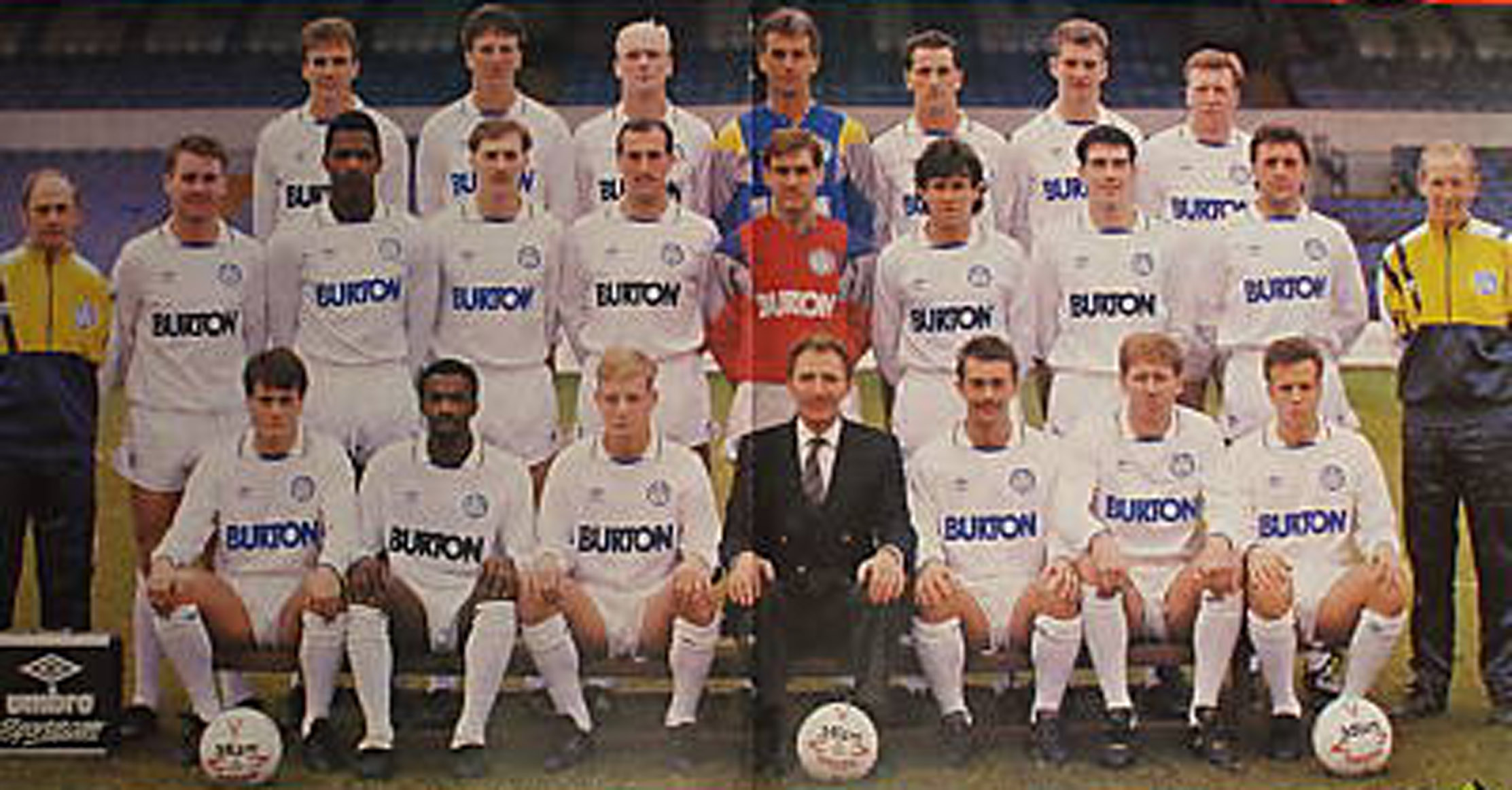
Back Row: Andy Williams, John Pearson, Neil Aspin, Mervyn Day, Mark Aizlewood, Peter Swan, Brendan Ormsby.
Middle Row: Alan Sutton (Physio), John Sheridan, Noel Blake, Peter Haddock, David Rennie, Ronnie Sinclair, Gary Williams, Bob Taylor, Bobby Davison, Mick Hennigan (Coach).
Front Row: Micky Adams, Vince Hilaire, David Batty, Howard Wilkinson (Manager), Glynn Snodin, Ian Baird, John Stiles.
1988-89
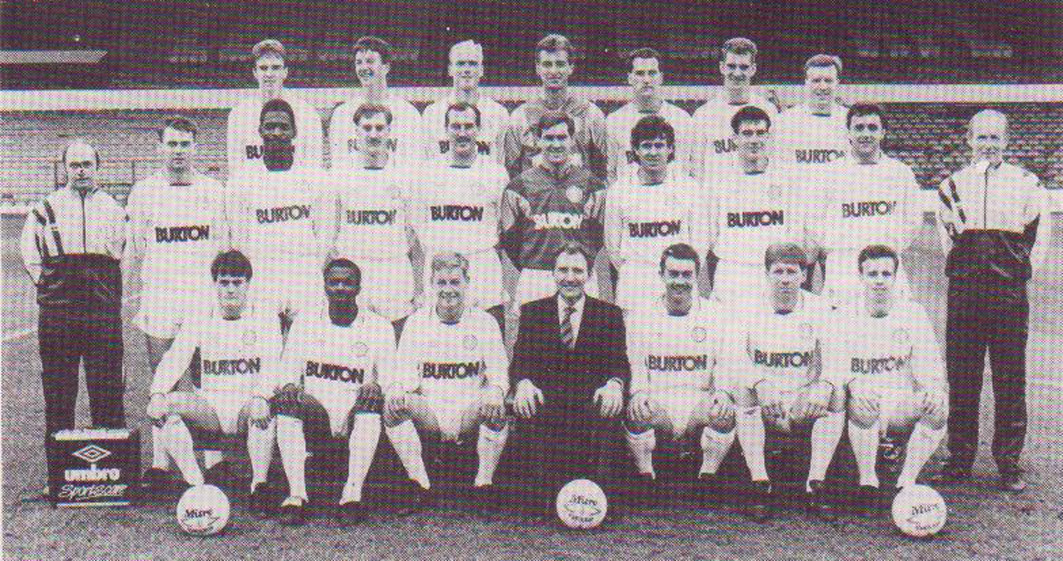
Back Row: Andy Williams, John Pearson, Neil Aspin, Mervyn Day, Mark Aizlewood, Peter Swan, Brendan Ormsby.
Middle Row: Alan Sutton (Physio), John Sheridan, Noel Blake, Peter Haddock, David Rennie, Ronnie Sinclair, Gary Williams, Bob Taylor, Bobby Davison, Mick Hennigan (Coach).
Front Row: Micky Adams, Vince Hilaire, David Batty, Howard Wilkinson (Manager), Glynn Snodin, Ian Baird, John Stiles.
1988-89
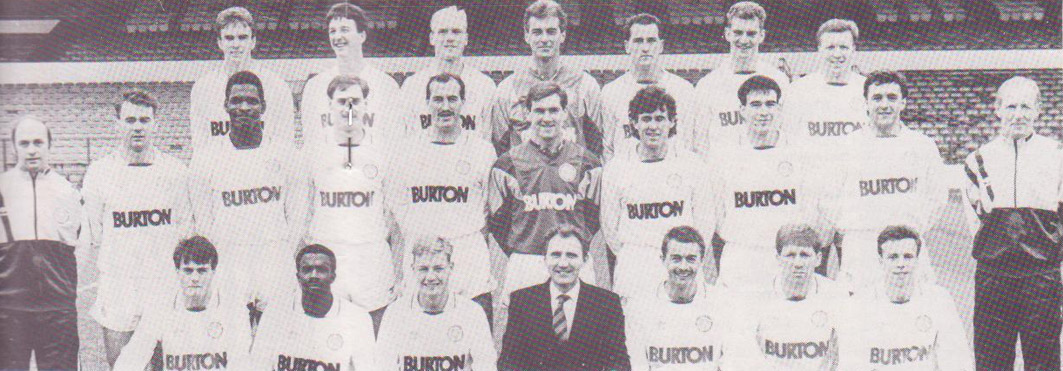
Back Row: Andy Williams, John Pearson, Neil Aspin, Mervyn Day, Mark Aizlewood, Peter Swan, Brendan Ormsby.
Middle Row: Alan Sutton (Physio), John Sheridan, Noel Blake, Peter Haddock, David Rennie, Ronnie Sinclair, Gary Williams, Bob Taylor, Bobby Davison, Mick Hennigan (Coach).
Front Row: Micky Adams, Vince Hilaire, David Batty, Howard Wilkinson (Manager), Glynn Snodin, Ian Baird, John Stiles.
1988-89
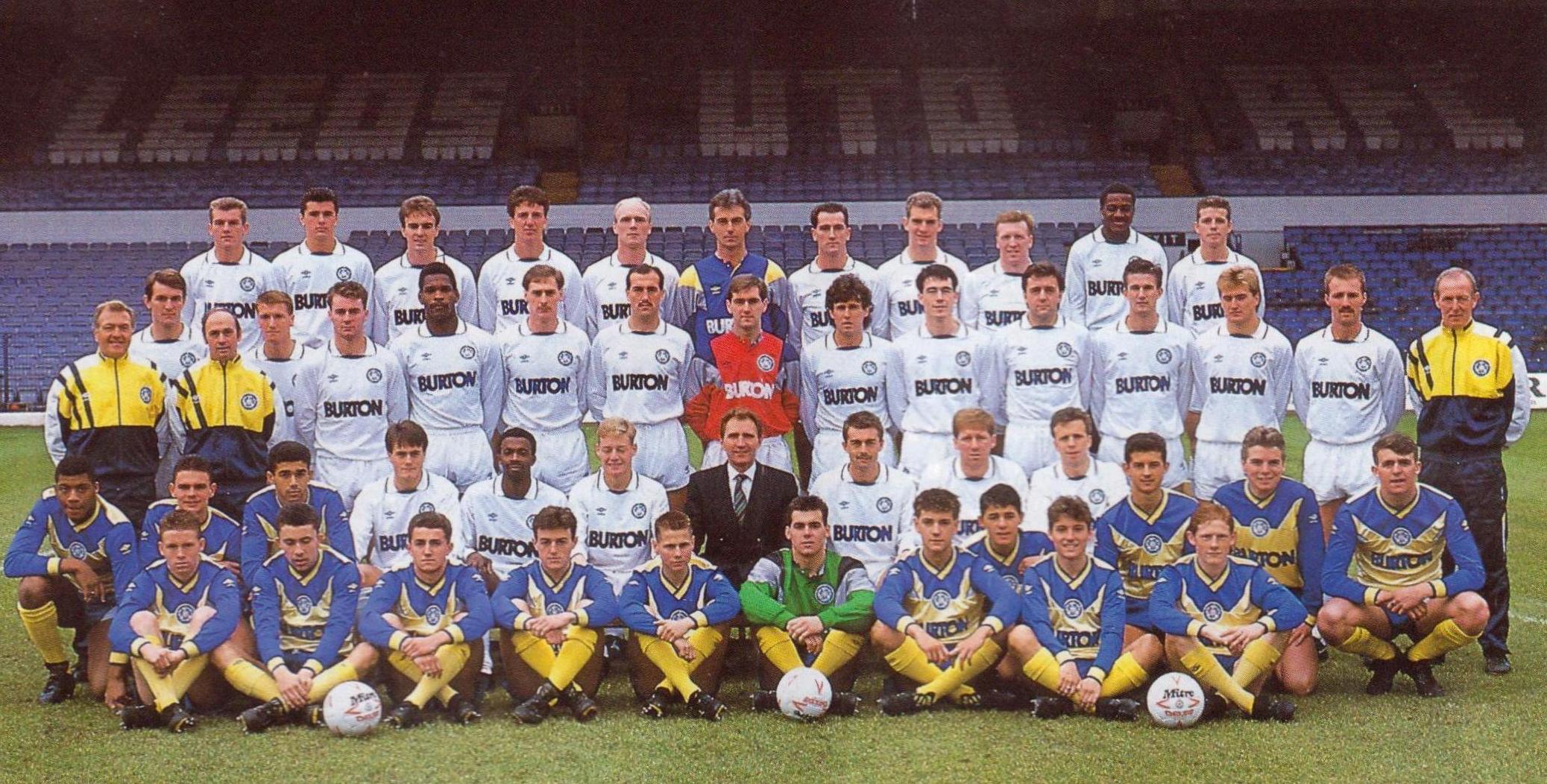
Back Row: Peter Maguire, Gary Speed, Andy Williams, John Pearson, Neil Aspin, Mervyn Day, Mark Aizlewood, Peter Swan, Brendan Ormsby, Kevin Noteman, Nigel Smith.
Middle Row: Peter Gunby (Youth Coach), Mike Whitlow, Alan Sutton (Physio), John Sheridan, Noel Blake, Peter Haddock, David Rennie, Ronnie Sinclair, Gary Williams, Bob Taylor, Bobby Davison, Simon Grayson, Peter Mumby, Neil Parsley, Mick Hennigan (Coach).
Second Row: Grenville Shorte, Jason Longstaff, Russell Wigley, Micky Adams, Vince Hilaire, David Batty, Howard Wilkinson (Manager), Glynn Snodin, Ian Baird, John Stiles, Scott Blunt, Tony Smart, Michael Sloane.
Front Row: Scott Rogan, Simon Old, Wayne Jackson, Darren Edmonds, Michael Knop, Neil Edwards, Justin Sumner, Lee Stephens, Darryl Franklyn, Stephen Nicholson.
1988-89: Juniors
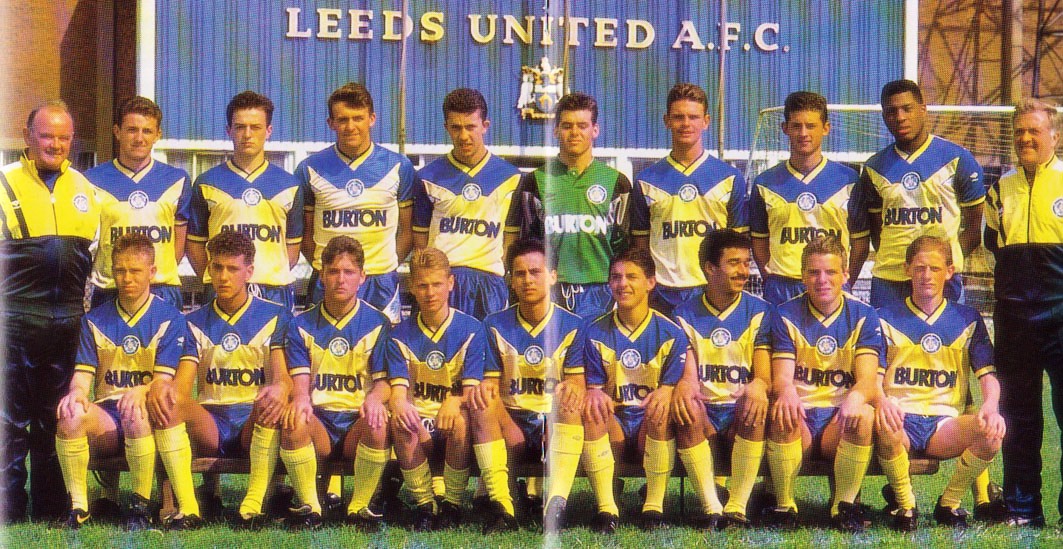
Back Row: Alan McIver (Physio), Wayne Jackson, Justin Sumner, Michael Sloane, Simon Old, Neil Edwards, Jason Longstaff, Scott Blunt, Grenville Shorte, Peter Gunby (Coach).
Front Row: Scott Rogan, Darren Edmonds, Darryl Franklyn, Michael Knop, Jeremy Smith, Lee Stephens, Russell Wigley, Tony Smart, Steve Nicholson.
1988-89: Juniors
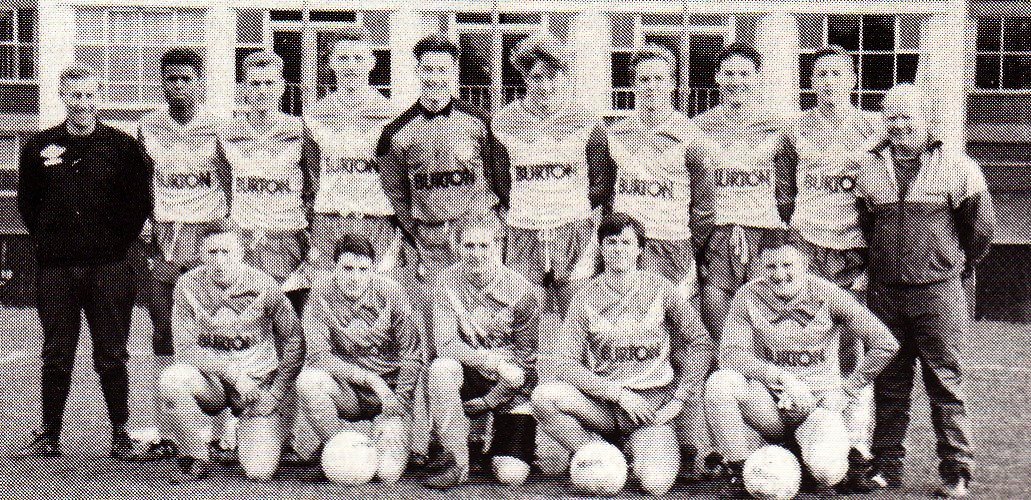
Back Row: Peter Cooper (Coach), Steven Mulrain, Jonathan Taylor, Andy Crosby, Simon Taylor, Damian Henderson, Simon Brooker, Mark Preston, Alec Nesovic, Terry Rhodes (Manager).
Front Row: Richard Harrison, Michael Norton, Gareth Stoker, Christopher Gott, Darren Hayward.
1989-90: Second Division Champions
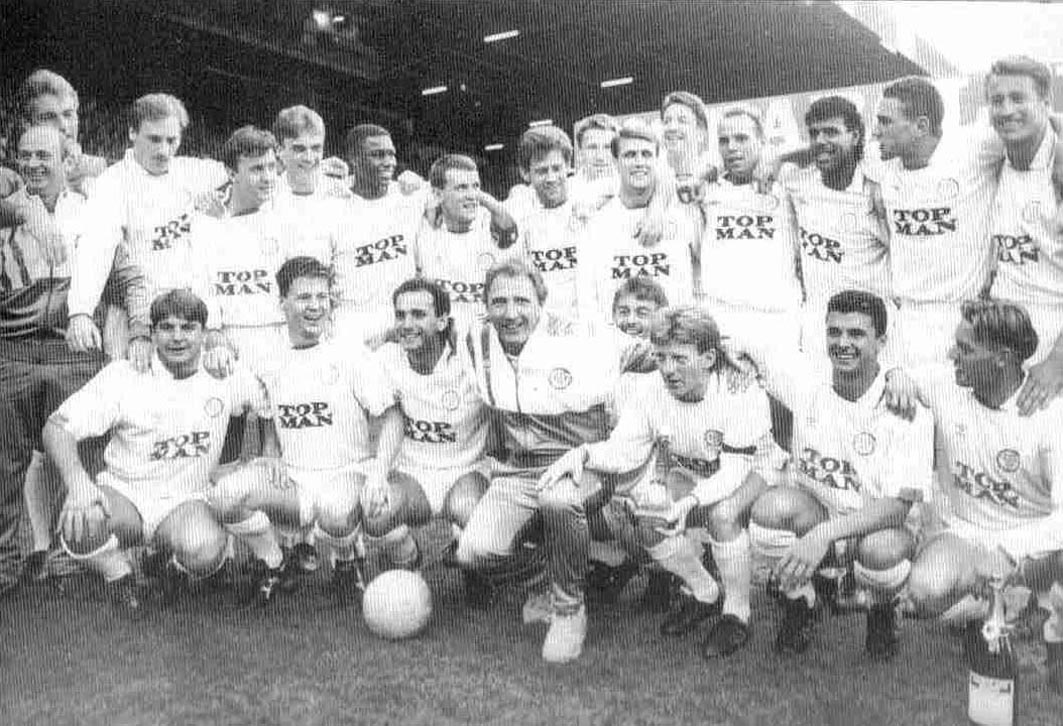
Back Row: Alan Sutton (Physio), Mervyn Day, Peter Haddock, Bobby Davison, Chris Fairclough, Mike Whitlow, Jim Beglin, John McClelland, Carl Shutt, John Pearson, Mel Sterland, Chris Kamara, Vinnie Jones, Lee Chapman.
Front Row: John Hendrie, Dylan Kerr, Imre Varadi, Howard Wilkinson (Manager), Glynn Snodin, Gordon Strachan, Gary Speed, David Batty.
1989-90
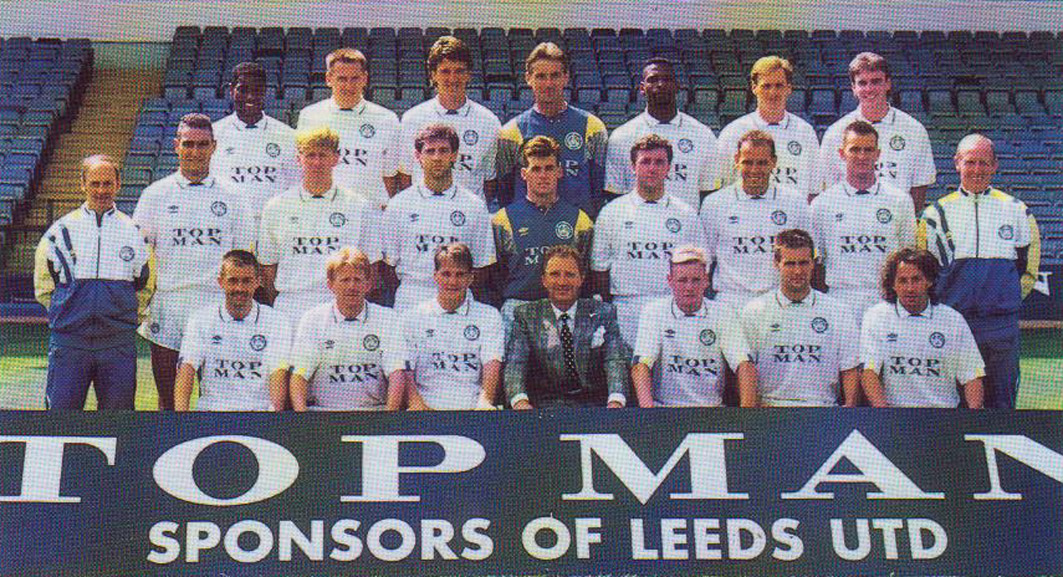
Back Row: Chris Fairclough, John McClelland, John Pearson, Mervyn Day, Noel Blake, Peter Haddock, Andy Williams.
Middle Row: Alan Sutton (Physio), Vinnie Jones, Ian Baird, Jim Beglin, Neil Edwards, Bobby Davison, Mel Sterland, Mike Whitlow, Mick Hennigan (Coach).
Front Row: Glynn Snodin, Gordon Strachan, John Hendrie, Howard Wilkinson (Manager), David Batty, Carl Shutt, Mickey Thomas.
1989-90
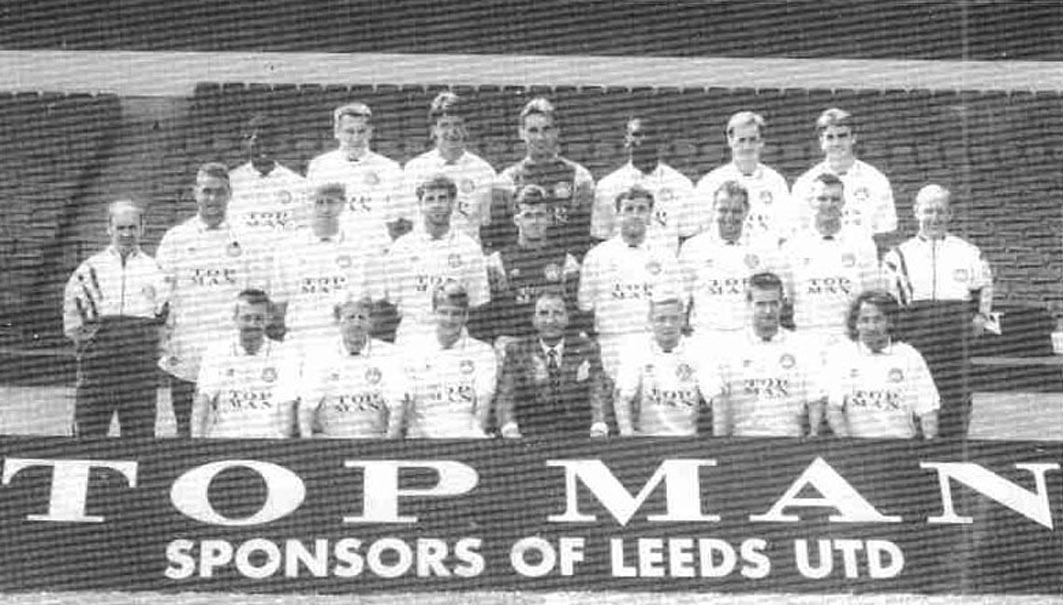
Back Row: Chris Fairclough, John McClelland, John Pearson, Mervyn Day, Noel Blake, Peter Haddock, Andy Williams.
Middle Row: Alan Sutton (Physio), Vinnie Jones, Ian Baird, Jim Beglin, Neil Edwards, Bobby Davison, Mel Sterland, Mike Whitlow, Mick Hennigan (Coach).
Front Row: Glynn Snodin, Gordon Strachan, John Hendrie, Howard Wilkinson (Manager), David Batty, Carl Shutt, Mickey Thomas.
1989-90
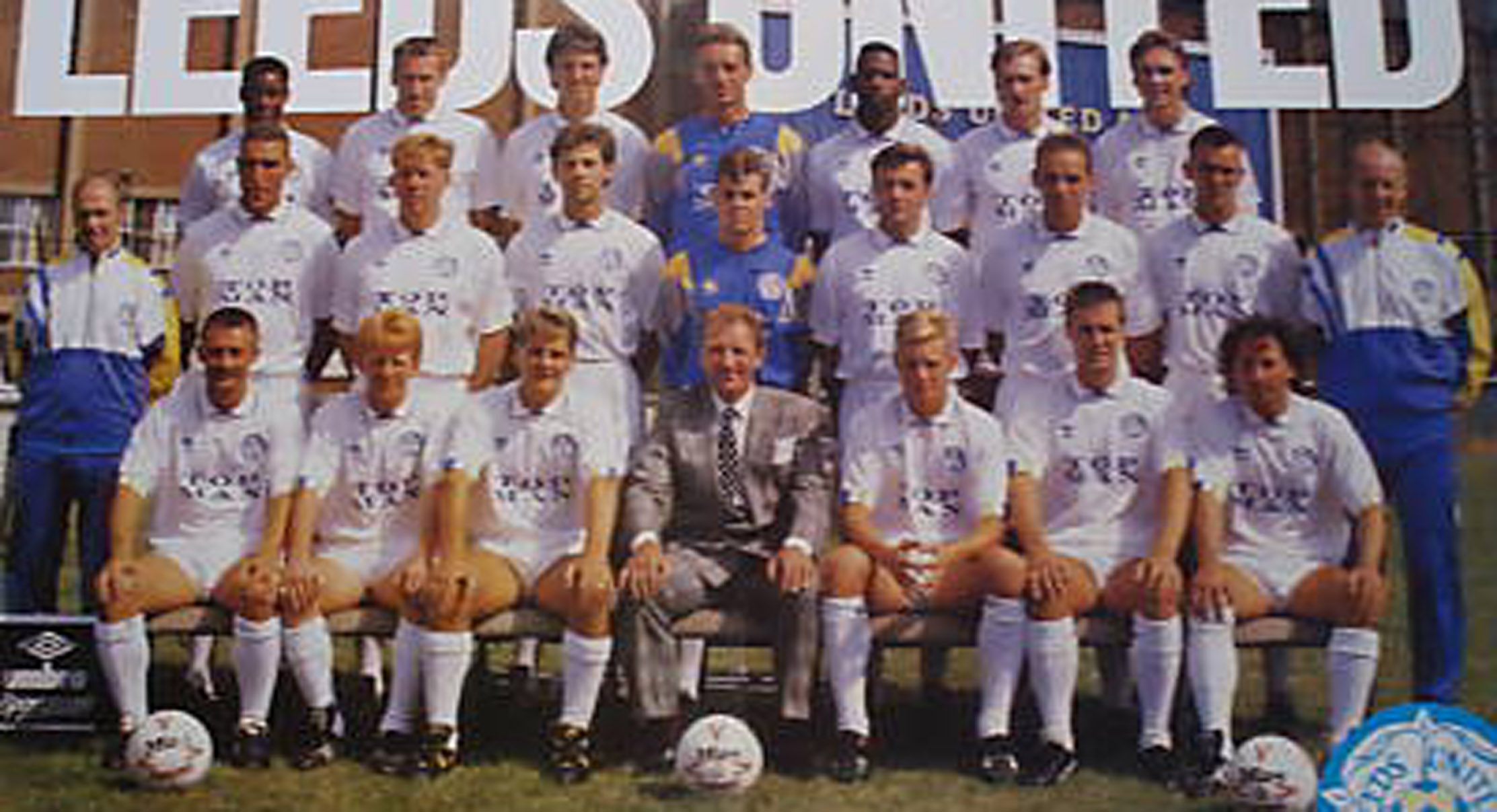
Back Row: Chris Fairclough, John McClelland, John Pearson, Mervyn Day, Noel Blake, Peter Haddock, Andy Williams.
Middle Row: Alan Sutton (Physio), Vinnie Jones, Ian Baird, Jim Beglin, Neil Edwards, Bobby Davison, Mel Sterland, Mike Whitlow, Mick Hennigan (Coach).
Front Row: Glynn Snodin, Gordon Strachan, John Hendrie, Howard Wilkinson (Manager), David Batty, Carl Shutt, Mickey Thomas.
1989-90:
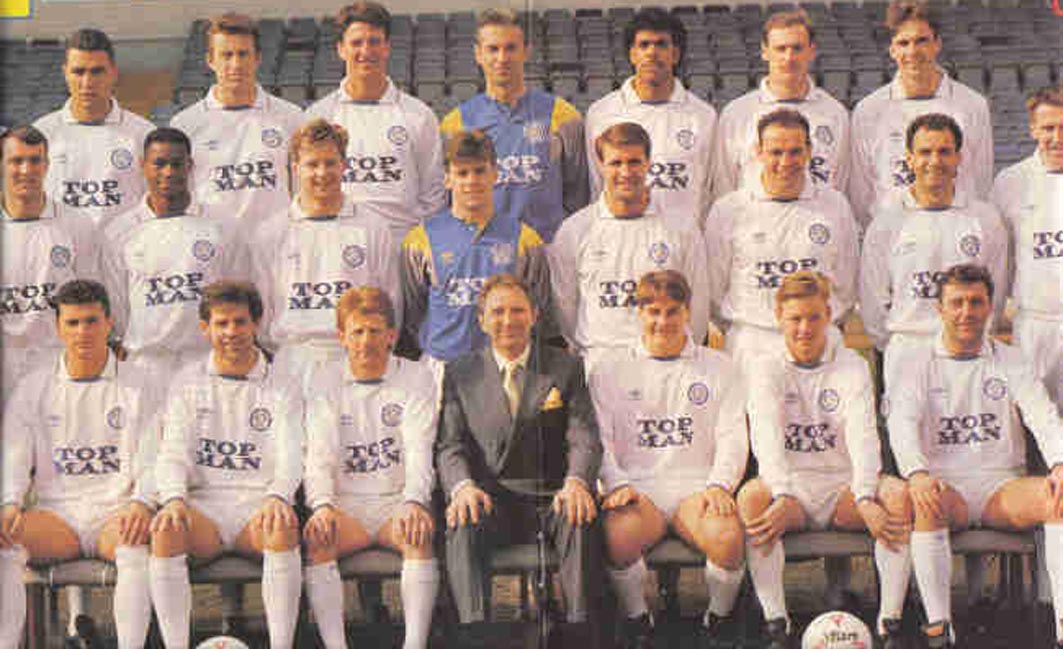
Back Row: Vinnie Jones, Lee Chapman, John Pearson, Mervyn Day, Chris Kamara, Peter Haddock, Andy Williams.
Middle Row: Mike Whitlow, Chris Fairclough, Dylan Kerr, Neil Edwards, Carl Shutt, Mel Sterland, Imre Varadi, John McClelland.
Front Row: Gary Speed, Jim Beglin, Gordon Strachan, Howard Wilkinson (Manager), John Hendrie, David Batty, Bobby Davison.
1989-90:
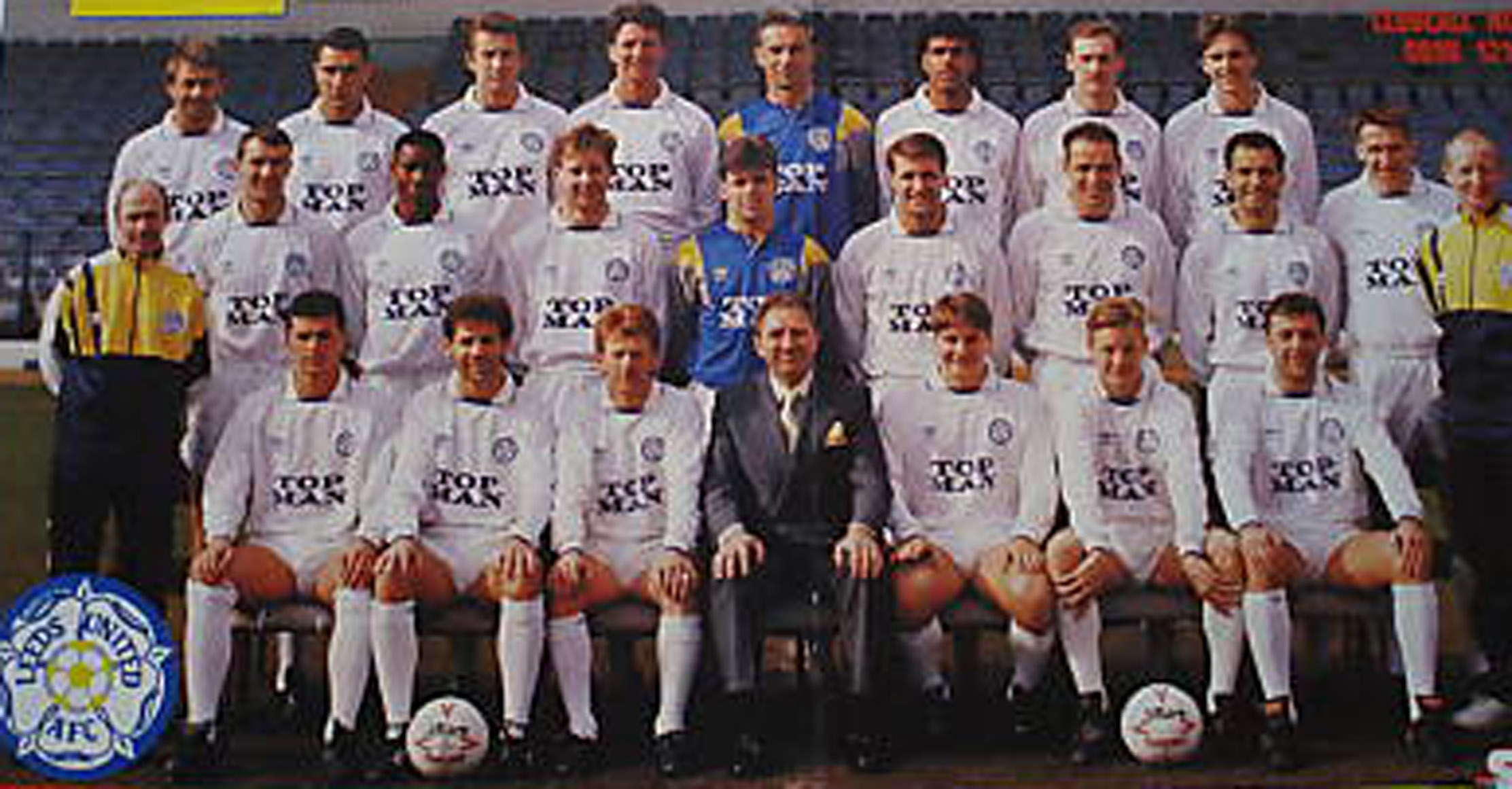
Back Row: Glynn Snodin, Vinnie Jones, Lee Chapman, John Pearson, Mervyn Day, Chris Kamara, Peter Haddock, Andy Williams.
Middle Row: Alan Sutton (Physio), Mike Whitlow, Chris Fairclough, Dylan Kerr, Neil Edwards, Carl Shutt, Mel Sterland, Imre Varadi, John McClelland, Mick Hennigan (Coach).
Front Row: Gary Speed, Jim Beglin, Gordon Strachan, Howard Wilkinson (Manager), John Hendrie, David Batty, Bobby Davison.
1989-90: Under 16
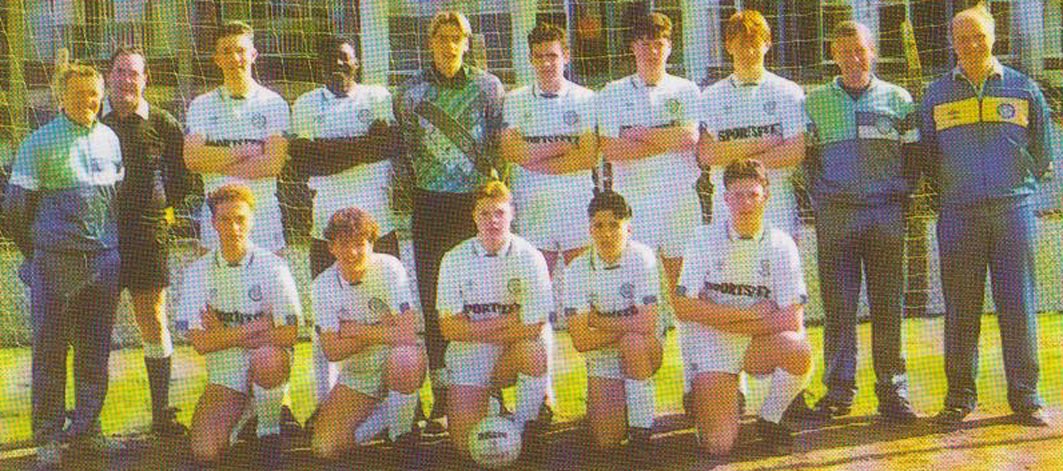
Back Row: Peter Gunby (Coach), Fred Brady (Coach), Trialist, Marlon Billy, Chris Flear, Marcus Phillpott, Trialist, James Greenwood, Peter Cooper (Coach), Mike Car (Coach).
Front Row: Kyle Talbot, Trialist, John Gallagher, Sean Moore, Andy Aldham. Missing from photograph: James Anderson, Richard Hepworth, David Brooker, Sean McNeil, Robert Scales.
1989-90: Juniors
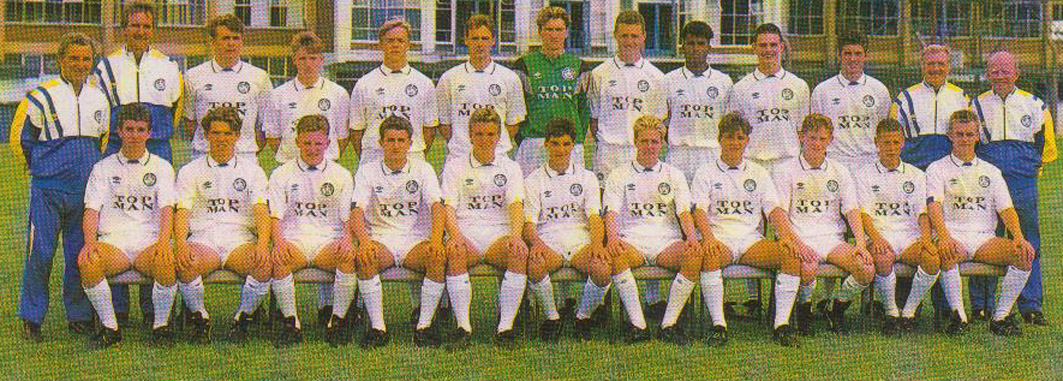
Back Row: Eddie Beaglehole (Coach), Dick Bate (Coach), Michael Sloanes, Scott Rogan, Simon Brooker, Mark Preston, Paul Watson, Andy Crosby, Steve Mulrain, Jason Longstaff, Scott Blunt, Peter Gunby (Coach), Terry Rhodes (Manager).
Front Row: Len Curtis, Ross Morgan, Darren Hayward, Wayne Jackson, Tony Smart, Ryan Nicholls, Gareth Stoker, Darryl Franklin, Steve Nicholson, Michael Knopp, Patrick Little.
1990-91
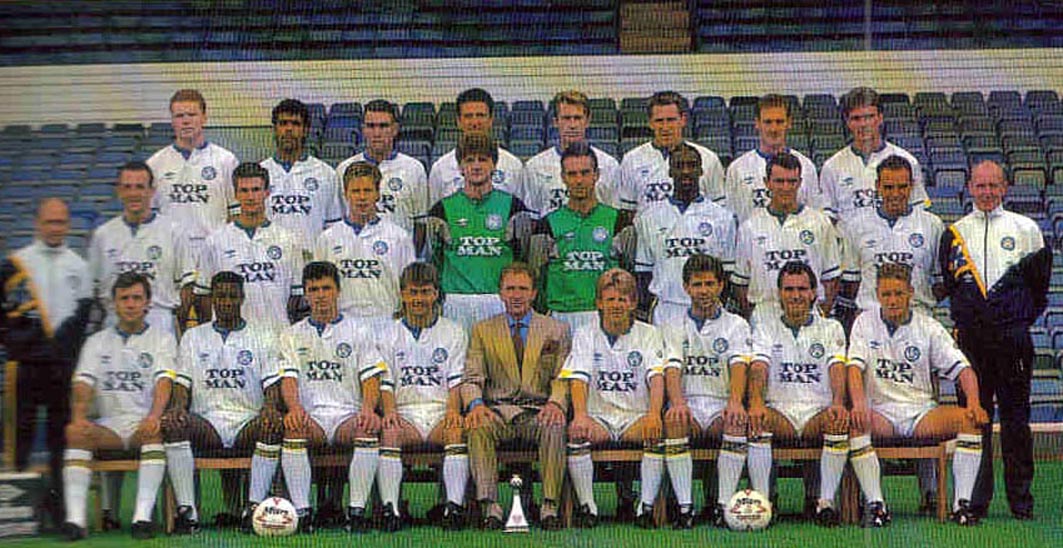
Back Row: Chris O'Donnell, Chris Kamara, Vinnie Jones, John Pearson, Lee Chapman, John McClelland, Peter Haddock, Andy Williams.
Middle Row: Alan Sutton (Physio), Gary McAllister, Simon Grayson, Dylan Kerr, John Lukic, Mervyn Day, Chris Whyte, Mike Whitlow, Mel Sterland, Mick Hennigan (Coach).
Front Row: Bobby Davison, Chris Fairclough, Gary Speed, Glynn Snodin, Howard Wilkinson (Manager), Gordon Strachan, Jim Beglin, Imre Varadi, David Batty.
1990-91
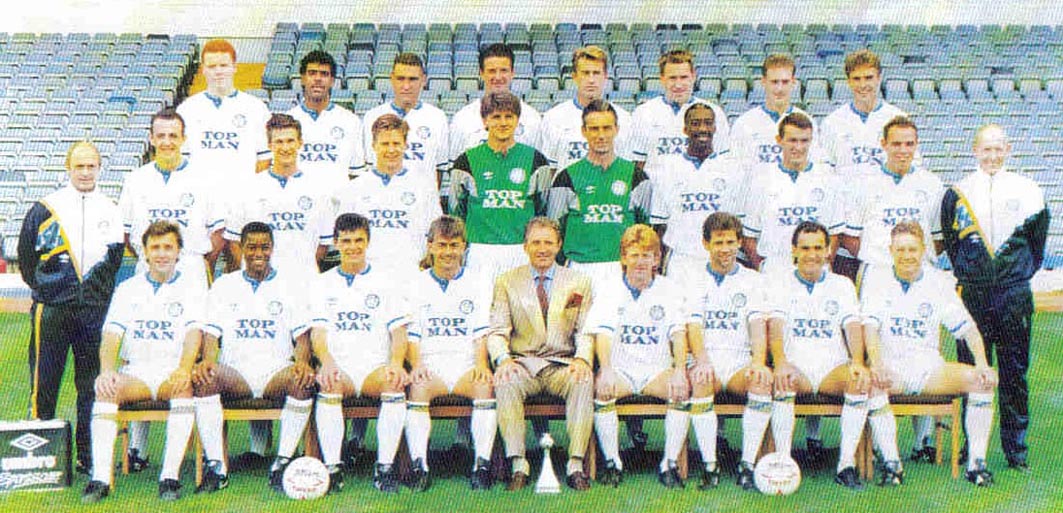
Back Row: Chris O'Donnell, Chris Kamara, Vinnie Jones, John Pearson, Lee Chapman, John McClelland, Peter Haddock, Andy Williams.
Middle Row: Alan Sutton (Physio), Gary McAllister, Simon Grayson, Dylan Kerr, John Lukic, Mervyn Day, Chris Whyte, Mike Whitlow, Mel Sterland, Mick Hennigan (Coach).
Front Row: Bobby Davison, Chris Fairclough, Gary Speed, Glynn Snodin, Howard Wilkinson (Manager), Gordon Strachan, Jim Beglin, Imre Varadi, David Batty.
1990-91
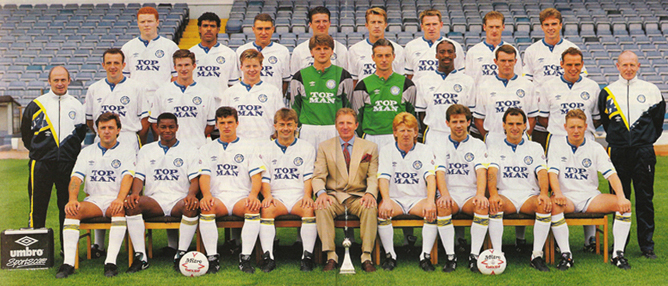
Back Row: Chris O'Donnell, Chris Kamara, Vinnie Jones, John Pearson, Lee Chapman, John McClelland, Peter Haddock, Andy Williams.
Middle Row: Alan Sutton (Physio), Gary McAllister, Simon Grayson, Dylan Kerr, John Lukic, Mervyn Day, Chris Whyte, Mike Whitlow, Mel Sterland, Mick Hennigan (Coach).
Front Row: Bobby Davison, Chris Fairclough, Gary Speed, Glynn Snodin, Howard Wilkinson (Manager), Gordon Strachan, Jim Beglin, Imre Varadi, David Batty.
1990-91
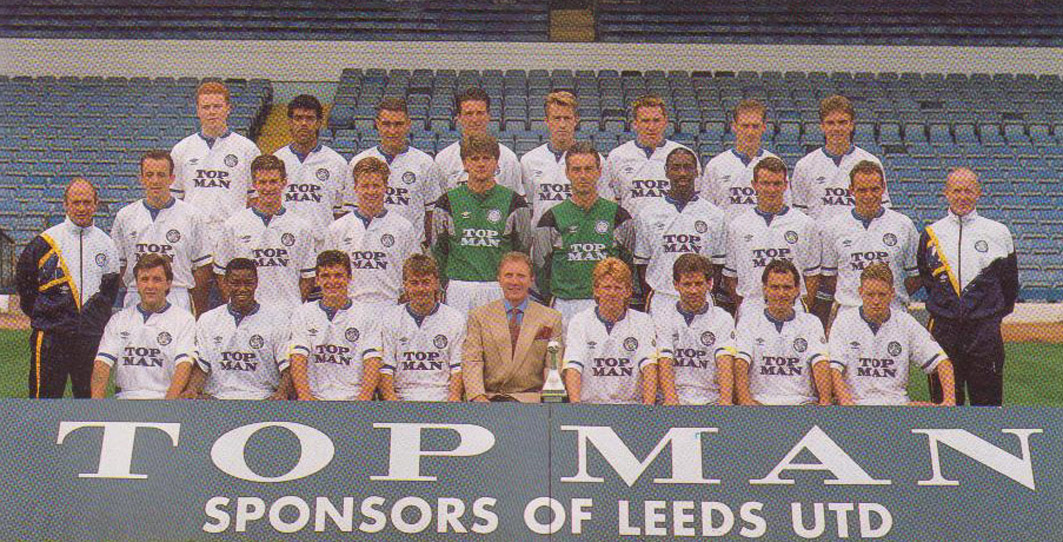
Back Row: Chris O'Donnell, Chris Kamara, Vinnie Jones, John Pearson, Lee Chapman, John McClelland, Peter Haddock, Andy Williams.
Middle Row: Alan Sutton (Physio), Gary McAllister, Simon Grayson, Dylan Kerr, John Lukic, Mervyn Day, Chris Whyte, Mike Whitlow, Mel Sterland, Mick Hennigan (Coach).
Front Row: Bobby Davison, Chris Fairclough, Gary Speed, Glynn Snodin, Howard Wilkinson (Manager), Gordon Strachan, Jim Beglin, Imre Varadi, David Batty.
1990-91
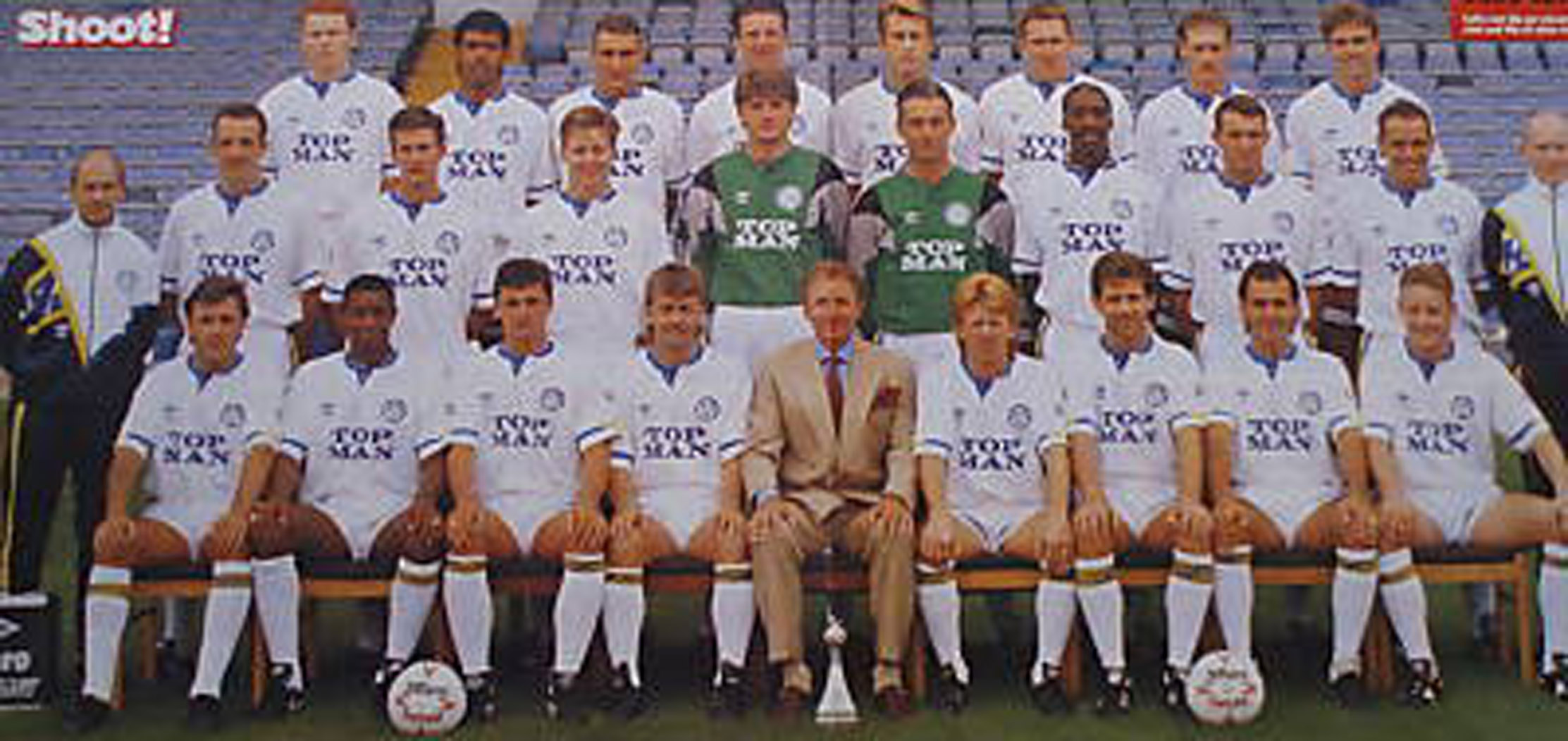
Back Row: Chris O'Donnell, Chris Kamara, Vinnie Jones, John Pearson, Lee Chapman, John McClelland, Peter Haddock, Andy Williams.
Middle Row: Alan Sutton (Physio), Gary McAllister, Simon Grayson, Dylan Kerr, John Lukic, Mervyn Day, Chris Whyte, Mike Whitlow, Mel Sterland, Mick Hennigan (Coach).
Front Row: Bobby Davison, Chris Fairclough, Gary Speed, Glynn Snodin, Howard Wilkinson (Manager), Gordon Strachan, Jim Beglin, Imre Varadi, David Batty.
1990-91
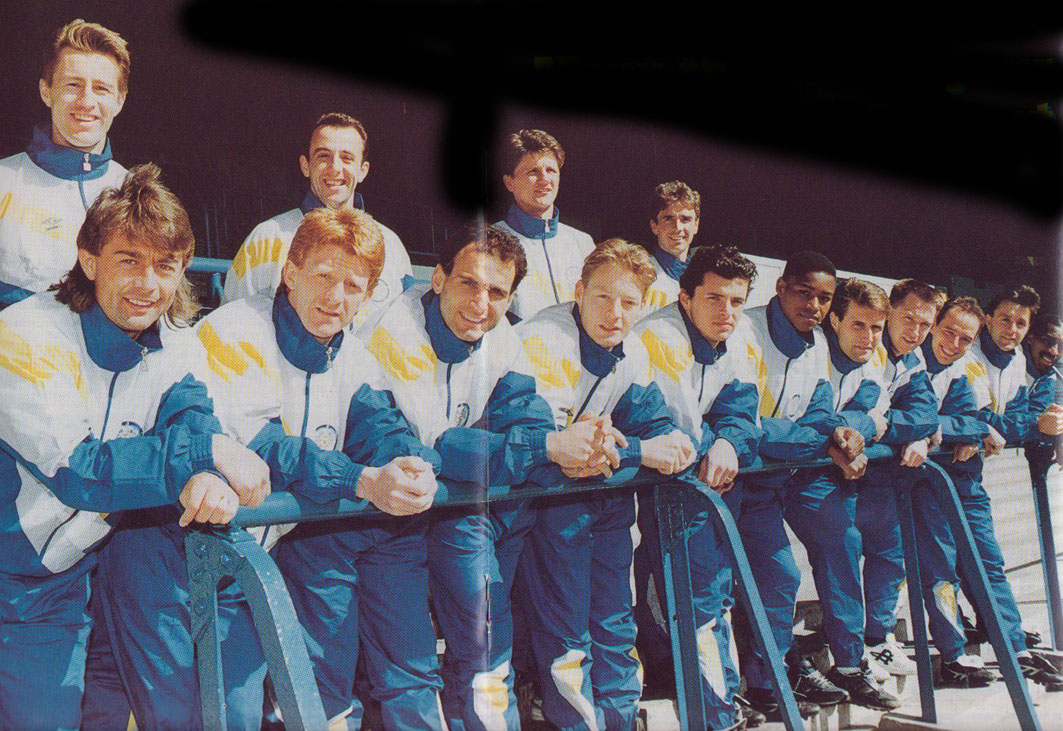
Back Row: Lee Chapman, Gary McAllister, John Lukic, Andy Williams.
Front Row: Glynn Snodin, Gordon Strachan, Imre Varadi, David Batty, Gary Speed, Chris Fairclough, Carl Shutt, John McClelland, Mel Sterland, Bobby Davison, Chris Whyte.
1990-91: Juniors
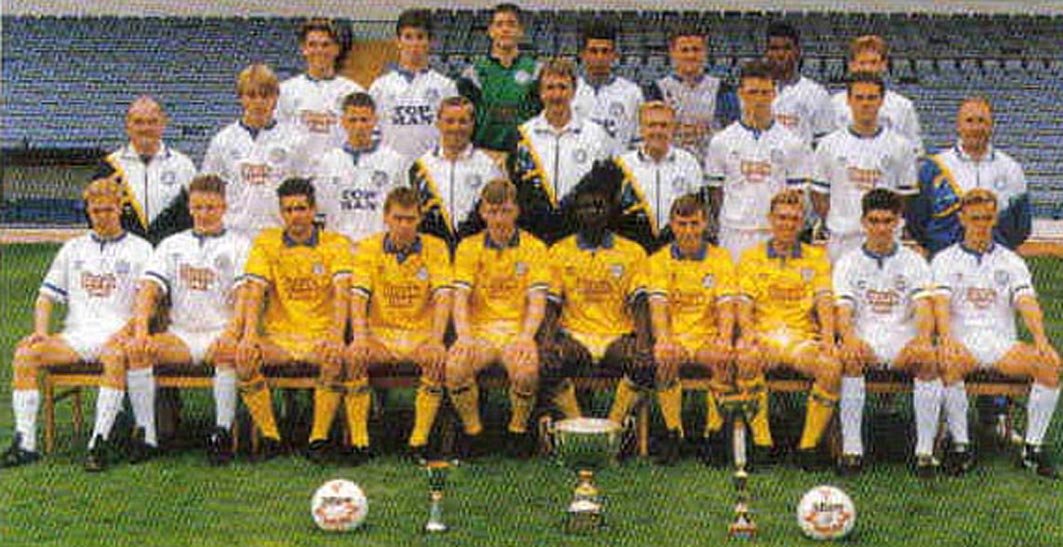
Back Row: Ross Morgan, Len Curtis, Chris Flear, Russell Wigley, Eddie Vanboxell, Steve Mulrain,Steve Nicholson.
Middle Row: Alan McIvor (Physio), Damian Henderson, Michael Knop, Eddie Beaglehole (Coach), Dick Bate (Coach), Peter Gunby (Coach), Andy Crosby, Mark Preston, John O’Byrne.
Front Row: Gareth Stoker, Darren Hayward, Marcus Philpott, Richard Hepworth, Gary O’Hara, Marlon Billy, Steven Ball, John Gallagher, Ryan Nicholls, Patrick Little.
1990-91: Under 16
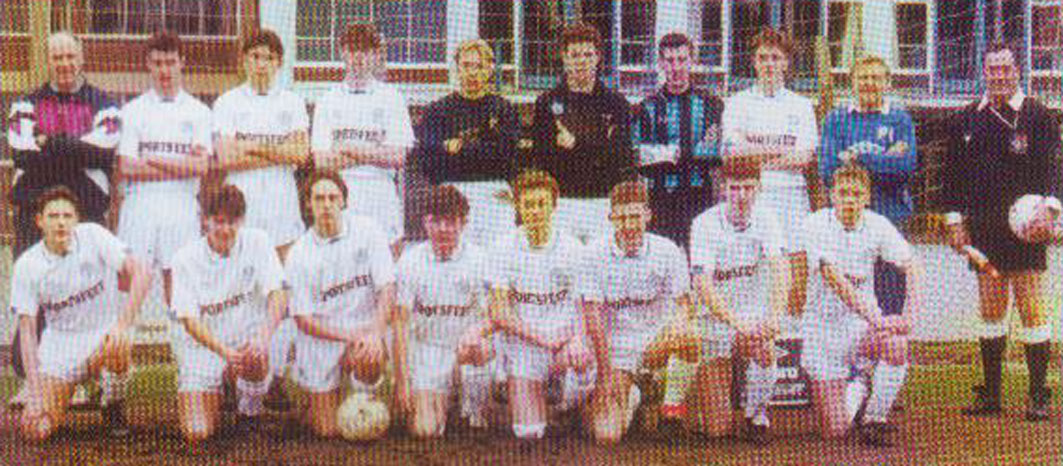
Back Row: Mike Carr (Coach), Mark Pugh, Damian Gilmore, Chris Sullivan, Scott Cousin, Richard Atkinson, Philip Barker, Kevin Daly, Peter Gunby (Coach), Fred Brady (Coach).
Front Row: Noel Whelan, Andy Couzens, Alex Byrne, Steve Tobin, Stuart McMichael, Matthew Flanaghan, Damian Holmes, Jonathan White. Scott Fitch, Simon Oliver and Mark Tinkler were absent when the photograph was taken.
1991-92: Pre-season Friendly in Ireland: Shelbourne at Tolka Park Dublin 24th July 1991
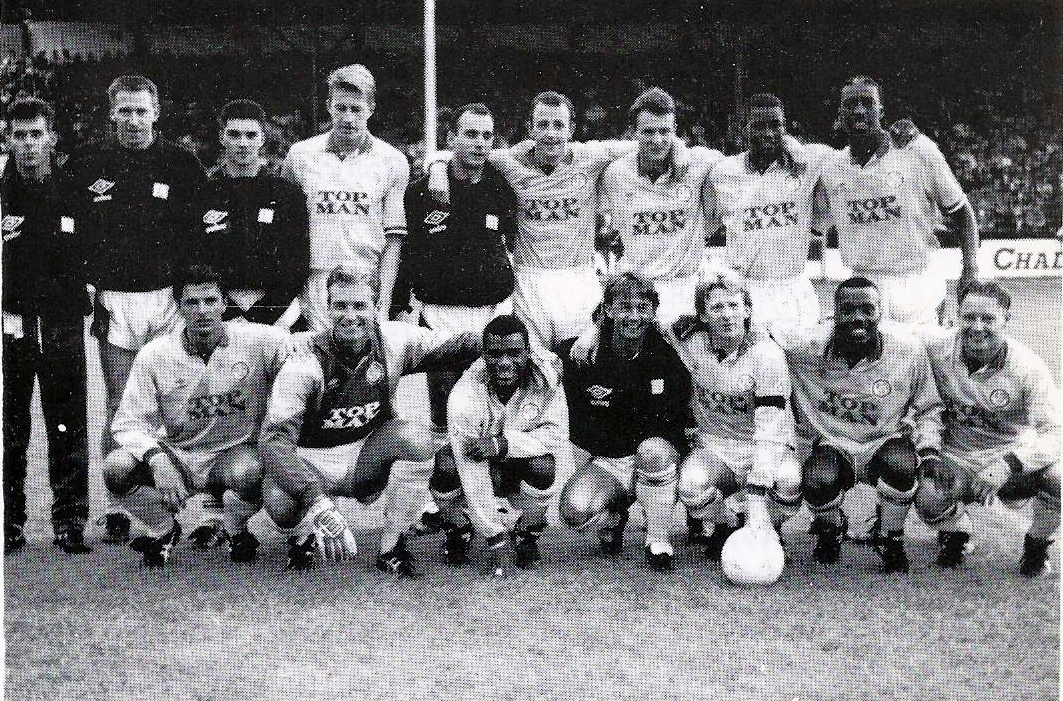
Back Row: Neil Edwards, John McClelland, Ryan Nicholls, Lee Chapman, Imre Varadi, Gary McAllister, Mike Whitlow, Chris Fairclough, Chris Whyte.
Front Row: Gary Speed, Mervyn Day, Ray Wallace, Glynn Snodin, Gordon Strachan, Rod Wallace, David Batty.
1991-92: Pre-season Friendly in Ireland: Shelbourne at Tolka Park Dublin 24th July 1991
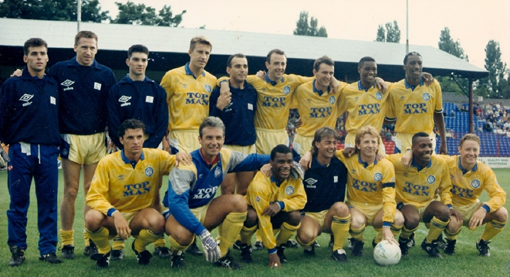
Back Row: Neil Edwards, John McClelland, Ryan Nicholls, Lee Chapman, Imre Varadi, Gary McAllister, Mike Whitlow, Chris Fairclough, Chris Whyte.
Front Row: Gary Speed, Mervyn Day, Ray Wallace, Glynn Snodin, Gordon Strachan, Rod Wallace, David Batty.
1991-92: Pre-season Friendly in Ireland: Cork City 26th July 1991
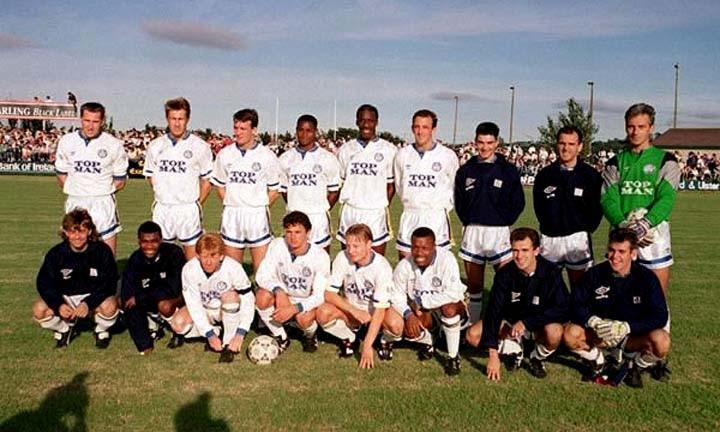
Back Row: John McClelland, Lee Chapman, Mike Whitlow, Chris Fairclough, Chris Whyte, Gary McAllister, Ryan Nicholls, Imre Varadi, Mervyn Day.
Front Row: Glynn Snodin, Ray Wallace, Gordon Strachan, Gary Speed, David Batty, Rod Wallace, Tony Dorigo, Neil Edwards.
1991-92: Champions
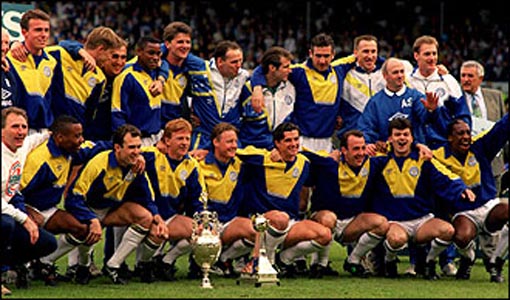
Back Row: Mick Hennigan (Coach), Jon Newsome, Lee Chapman, Sean Hardy (Kit Manager), Chris Fairclough, John Lukic, Mel Sterland, Carl Shutt, Eric Cantona, John McClelland, Alan Sutton (Physio), Peter Haddock, Les Silver (Director).
Front Row: Howard Wilkinson (Manager), Rod Wallace, Tony Dorigo, Gordon Strachan, David Batty, Gary Speed, Gary McAllister, Steve Hodge, Chris Whyte.
1991-92: Champions
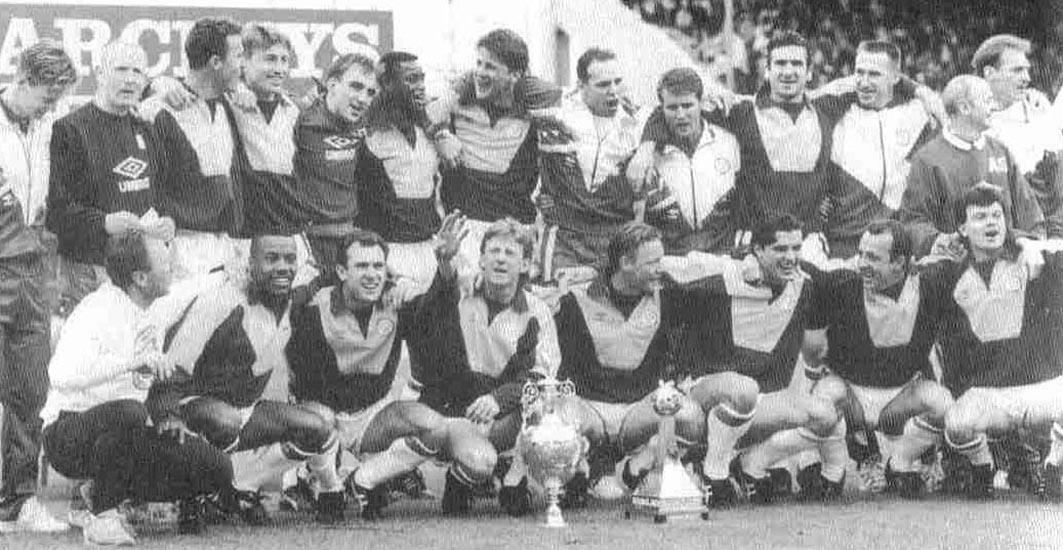
Back Row: Dylan Kerr, Mick Hennigan (Coach), Jon Newsome, Lee Chapman, Sean Hardy (Kit Manager), Chris Fairclough, John Lukic, Mel Sterland, Carl Shutt, Eric Cantona, John McClelland, Alan Sutton (Physio), Peter Haddock.
Front Row: Howard Wilkinson (Manager), Rod Wallace, Tony Dorigo, Gordon Strachan, David Batty, Gary Speed, Gary McAllister, Steve Hodge.
1991-92
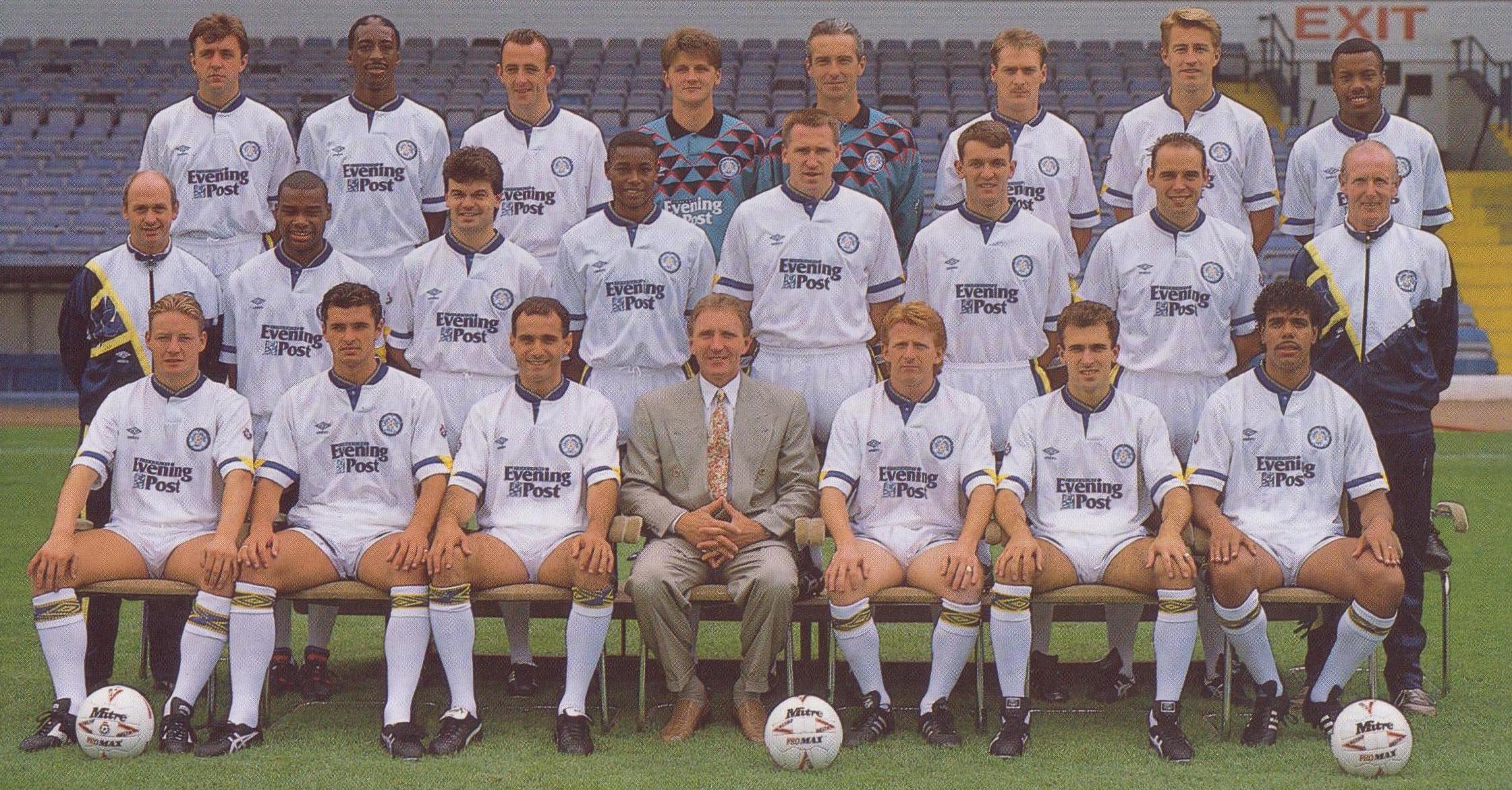
Back Row: Bobby Davison, Chris Whyte, Gary McAllister, John Lukic, Mervyn Day, Peter Haddock, Lee Chapman, Rod Wallace.
Middle Row: Alan Sutton (Physio), Ray Wallace, Steve Hodge, Chris Fairclough, John McClelland, Mike Whitlow, Mel Sterland, Mick Hennigan (Coach).
Front Row: David Batty, Gary Speed, Imre Varadi, Howard Wilkinson (Manager) Gordon Strachan, Tony Dorigo, Chris Kamara.
1991-92
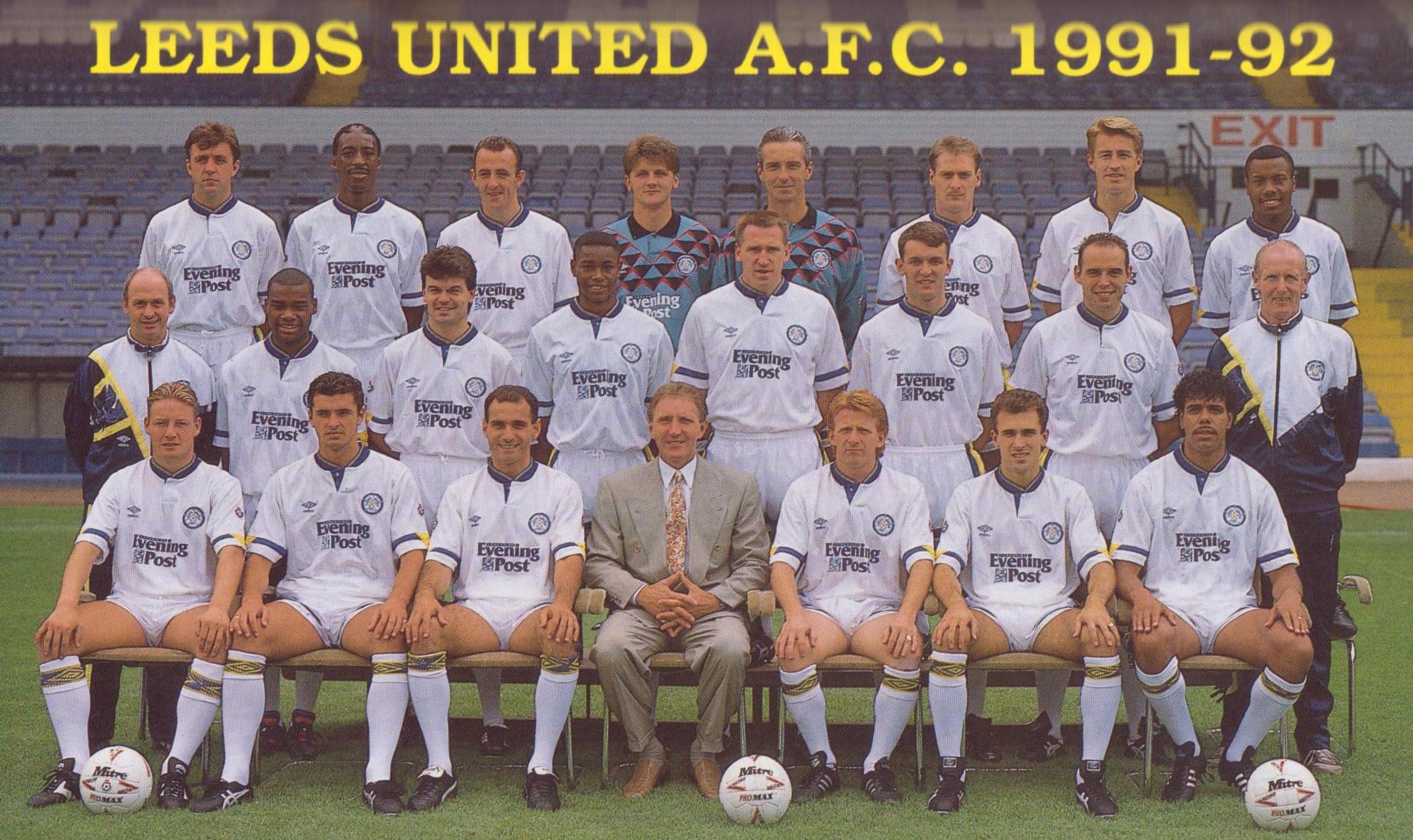
Back Row: Bobby Davison, Chris Whyte, Gary McAllister, John Lukic, Mervyn Day, Peter Haddock, Lee Chapman, Rod Wallace.
Middle Row: Alan Sutton (Physio), Ray Wallace, Steve Hodge, Chris Fairclough, John McClelland, Mike Whitlow, Mel Sterland, Mick Hennigan (Coach).
Front Row: David Batty, Gary Speed, Imre Varadi, Howard Wilkinson (Manager) Gordon Strachan, Tony Dorigo, Chris Kamara.
1991-92
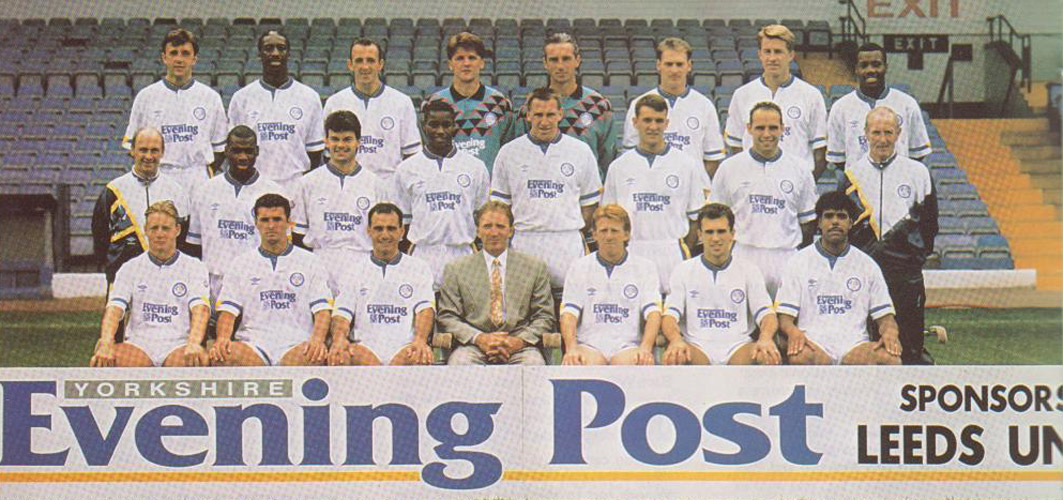
Back Row: Bobby Davison, Chris Whyte, Gary McAllister, John Lukic, Mervyn Day, Peter Haddock, Lee Chapman, Rod Wallace.
Middle Row: Alan Sutton (Physio), Ray Wallace, Steve Hodge, Chris Fairclough, John McClelland, Mike Whitlow, Mel Sterland, Mick Hennigan (Coach).
Front Row: David Batty, Gary Speed, Imre Varadi, Howard Wilkinson (Manager) Gordon Strachan, Tony Dorigo, Chris Kamara.
1992-93: with 1991-92 Championship Trophy
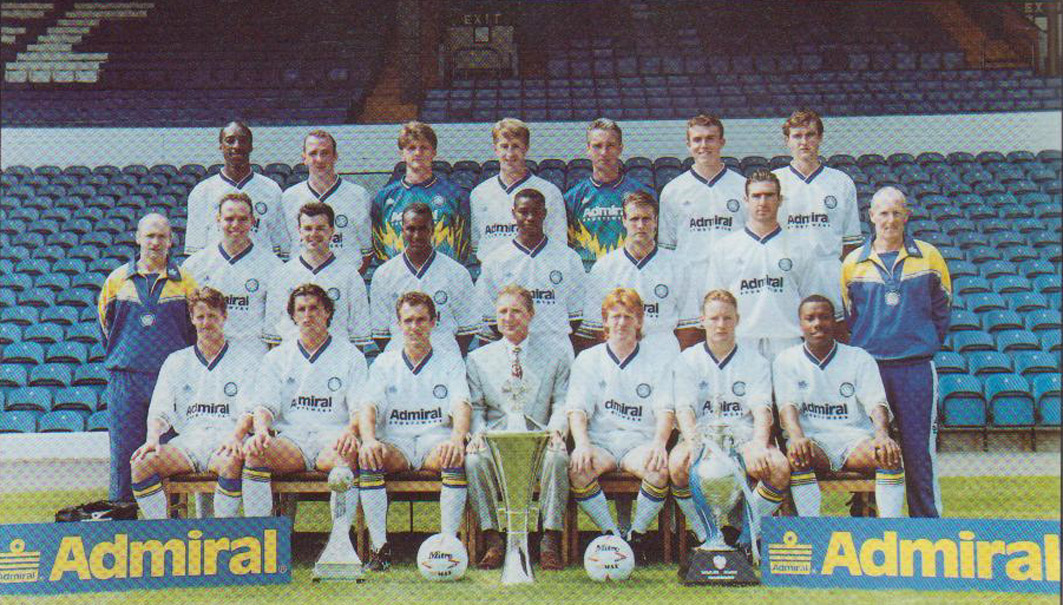
Back Row: Chris Whyte, Gary McAllister, John Lukic, Lee Chapman, Mervyn Day, Jon Newsome, David Wetherall.
Middle Row: Alan Sutton (Physio),Mel Sterland, Steve Hodge, David Rocastle, Chris Fairclough, Carl Shutt, Eric Cantona, Mick Hennigan (Coach).
Front Row: Scott Sellars, Gary Speed, Tony Dorigo, Howard Wilkinson (Manager), Gordon Strachan, David Batty, Rod Wallace.
1992-93: with 1991-92 Championship Trophy
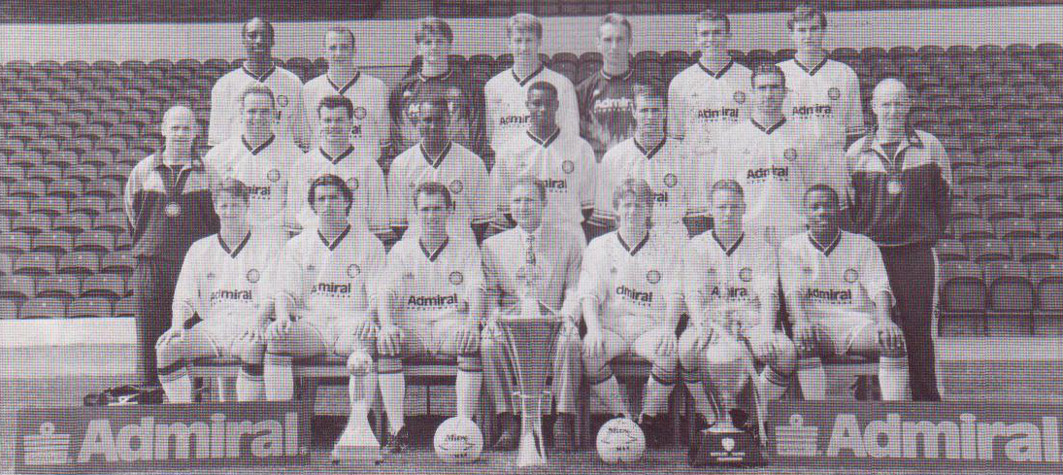
Back Row: Chris Whyte, Gary McAllister, John Lukic, Lee Chapman, Mervyn Day, Jon Newsome, David Wetherall.
Middle Row: Alan Sutton (Physio),Mel Sterland, Steve Hodge, David Rocastle, Chris Fairclough, Carl Shutt, Eric Cantona, Mick Hennigan (Coach).
Front Row: Scott Sellars, Gary Speed, Tony Dorigo, Howard Wilkinson (Manager), Gordon Strachan, David Batty, Rod Wallace.
1992-93: Charity Shield Winners at Wembley
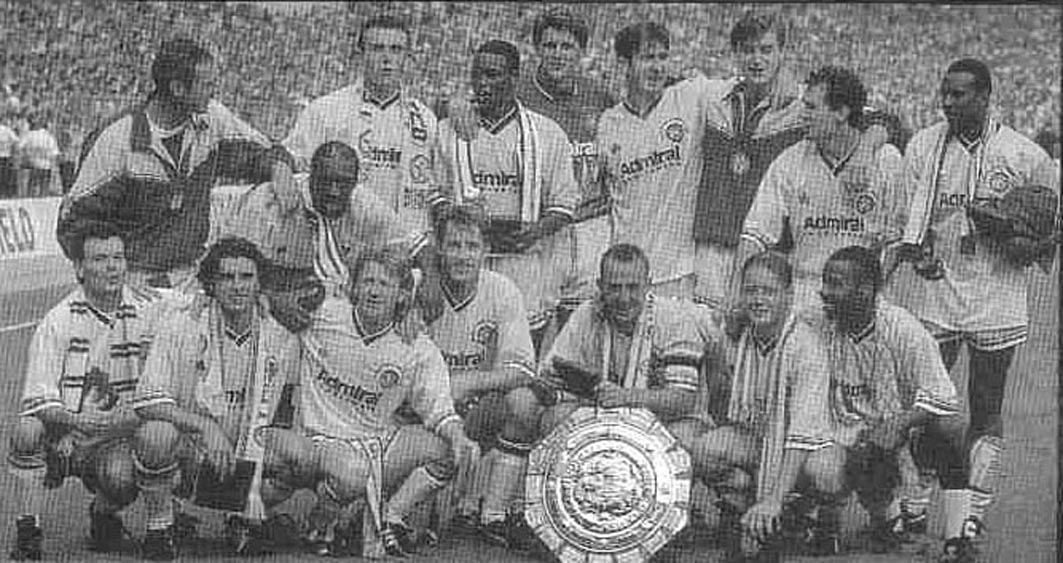
Back Row: Mervyn Day, Chris Whyte, Jon Newsome, Chris Fairclough, John Lukic, Eric Cantona, David Wetherall, Tony Dorigo, David Rocastle.
Front Row: Steve Hodge, Gary Speed, Gordan Strachan, Lee Chapman, Gary McAllister, David Batty, Rod Wallace.
1992-93: European Cup v Stuttgart at Barcelona
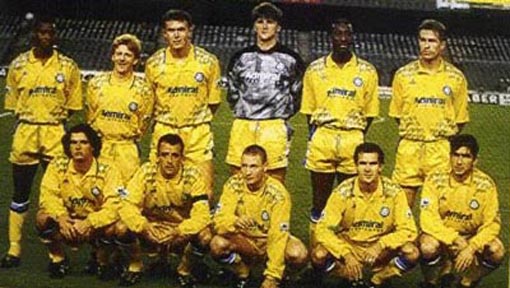
Back Row: Chris Fairclough, Gordon Strachan, Jon Newsome, John Lukic, Chris Whyte, Lee Chapman.
Front Row: Gary Speed, Gary McAllister, David Batty, Tony Dorigo, Eric Cantona.
1992-93: Juniors
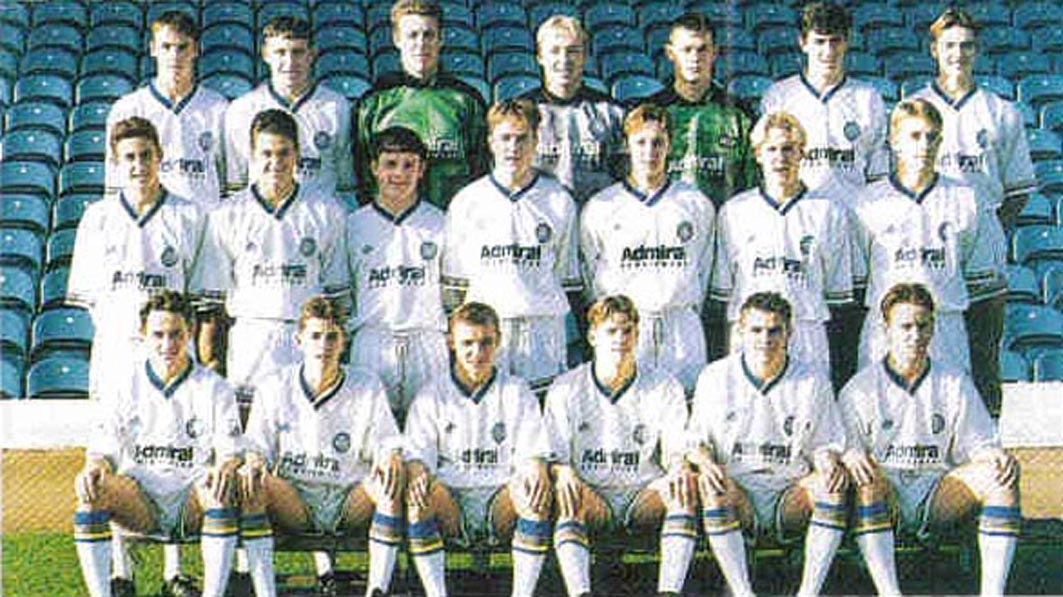
Back Row: Rob Bowman, Gary O'Hara, Richard Atkinson, Scott Cousin, Paul Pettinger, David Connor, Noel Whelan.
Middle Row: Matthew Smithard, Andy Couzens, Steve Tobin, Kevin Daly, Alex Byrne, Kevin Sharp, Simon Oliver.
Front Row: Gary Lynam, Mark Ford, Steven Hill, Michael Hoyle, Jamie Forrester, Martin Littlewood.
1992-93: Juniors
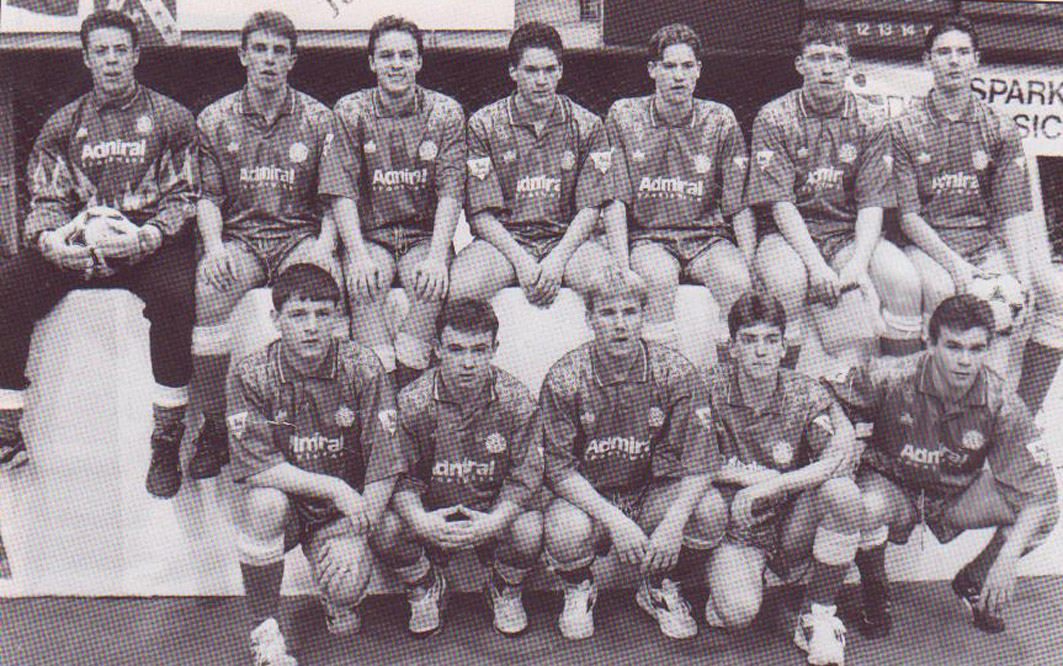
Back Row: Richard Atkinson, Simon Oliver, Alex Byrne, Andy Couzens, Michael Hoyle, Gary O'Hara, Noel Whelan.
Front Row: Steve Tobin, Steven Hill, Kevin Sharp, Mark Ford, Jamie Forrester.
1992-93: Juniors
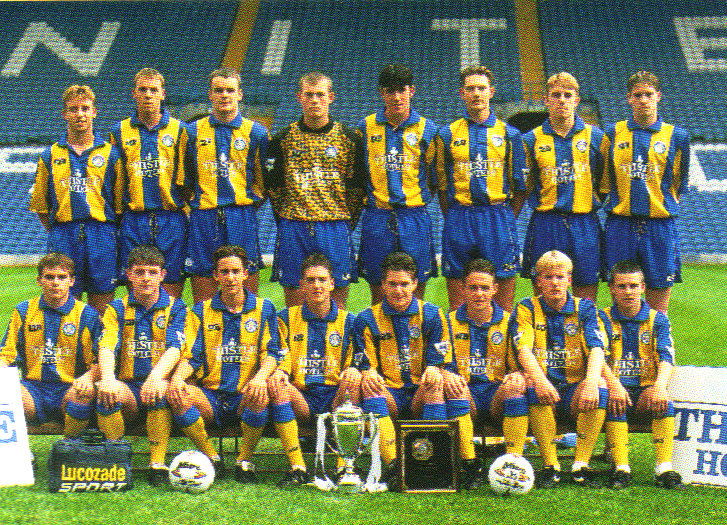
Back Row: Martin Littlewood, Robert Bowman, Mark Tinkler, Paul Pettinger, David Connor, Noel Whelan, Simon Oliver, Michael Hoyle.
Front Row: Jamie Forrester, Steve Tobin, Matthew Smithard, Mark Ford, Andy Couzens, Gary Lynam, Kevin Sharp, Paul Wharton.
1993-94
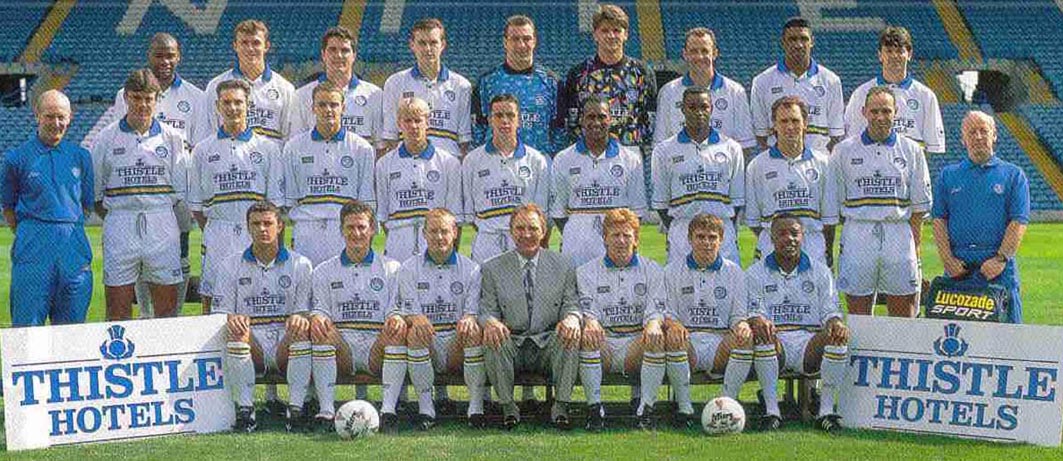
Back Row: Ray Wallace, Jon Newsome, Frank Strandli, David Wetherall, Mark Beeney, John Lukic, Gary McAllister, Brian Deane, Steve Hodge.
Middle Row: Mick Hennigan (Coach), David O’Leary, Noel Whelan, Mark Tinkler, Kevin Sharp, Gary Kelly, David Rocastle, Chris Fairclough, Tony Dorigo, Mel Sterland, Geoff Ladley (Physio).
Front Row: Gary Speed, David Kerslake, David Batty, Howard Wilkinson (Manager), Gordon Strachan, Jamie Forrester, Rod Wallace.
1993-94
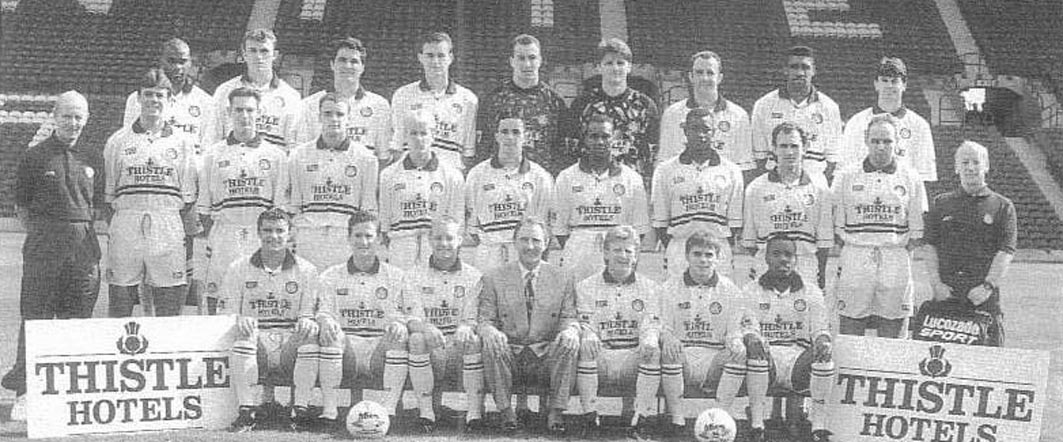
Back Row: Ray Wallace, Jon Newsome, Frank Strandli, David Wetherall, Mark Beeney, John Lukic, Gary McAllister, Brian Deane, Steve Hodge.
Middle Row: Mick Hennigan (Coach), David O’Leary, Noel Whelan, Mark Tinkler, Kevin Sharp, Gary Kelly, David Rocastle, Chris Fairclough, Tony Dorigo, Mel Sterland, Geoff Ladley (Physio).
Front Row: Gary Speed, David Kerslake, David Batty, Howard Wilkinson (Manager), Gordon Strachan, Jamie Forrester, Rod Wallace.
1994-95
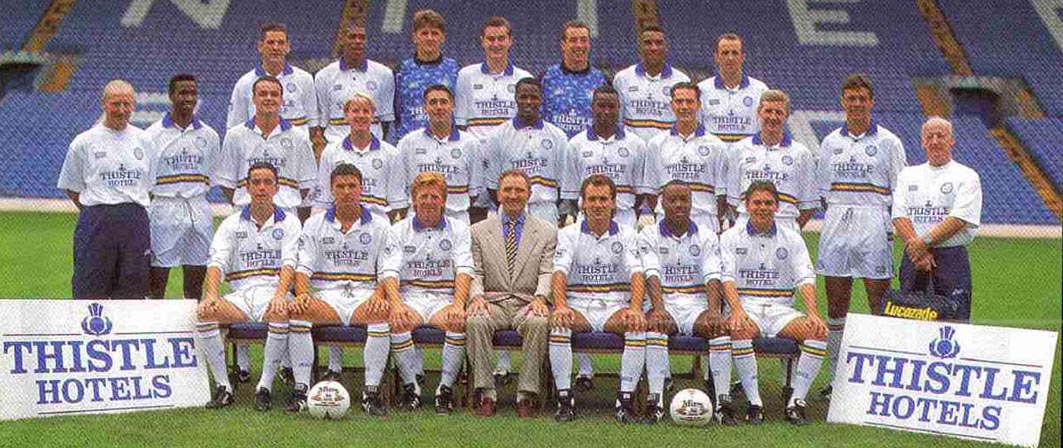
Back Row: David White, Carlton Palmer, John Lukic, David Wetherall, Mark Beeney, Brian Deane, Gary McAllister.
Middle Row: Mick Hennigan (Coach), Lucas Radebe, Mark Tinkler, Kevin Sharp, John Pemberton, Philomen Masinga, Chris Fairclough, Noel Whelan, Nigel Worthington, David O’Leary, Geoff Ladley (Physio).
Front Row: Gary Kelly, Gary Speed, Gordon Strachan, Howard Wilkinson (Manager), Tony Dorigo, Rod Wallace, Jamie Forrester.1994-95
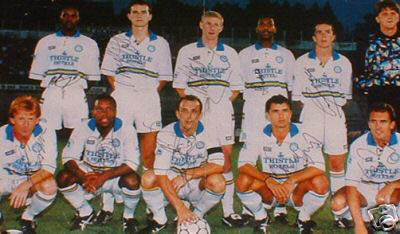
Back Row: Philomen Masinga, David Wetherall, Nigel Worthington, Lucas Radebe, Gary Kelly, John Lukic.
Front Row: Gordon Strachan, Rod Wallace, Gary McAllister, Gary Speed, Tony Dorigo.
1994-95: Ryedale Cup Final v Spurs
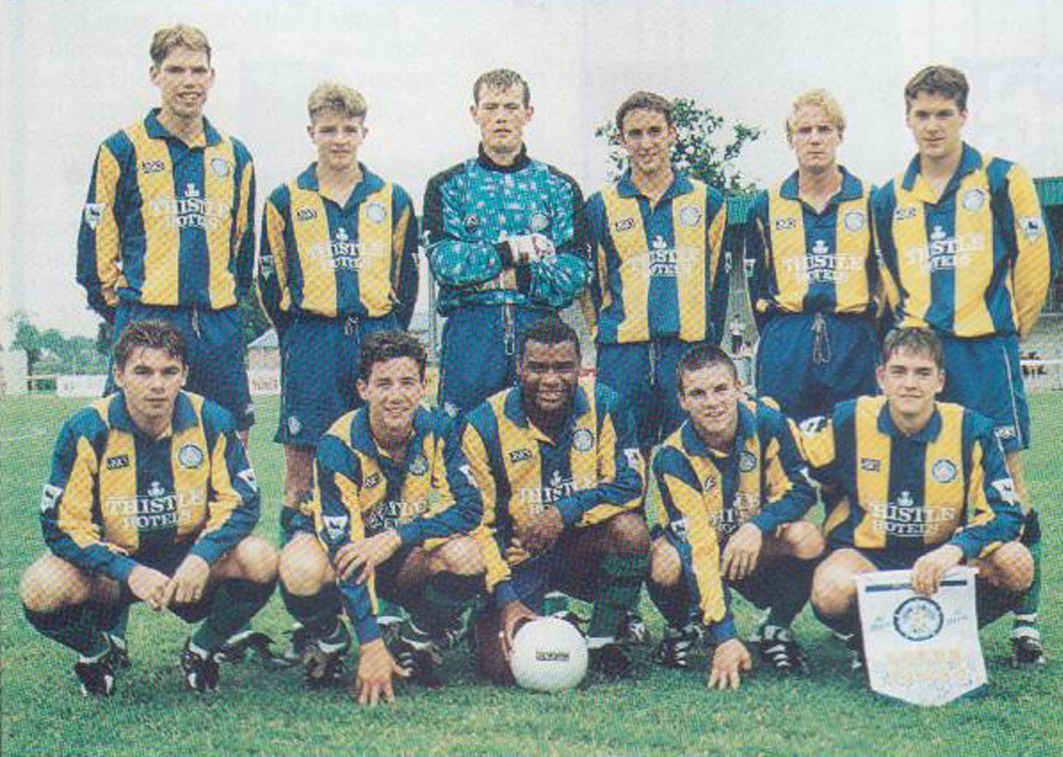
Back Row: Andy Brown, Mark Jackson, Paul Pettinger, Matthew Smithard, Kevin Sharp, Andy Couzens.
Front Row: Jamie Forrester, Jason Blunt, Ray Wallace, Paul Wharton, Mark Ford.
1994-95: Juniors
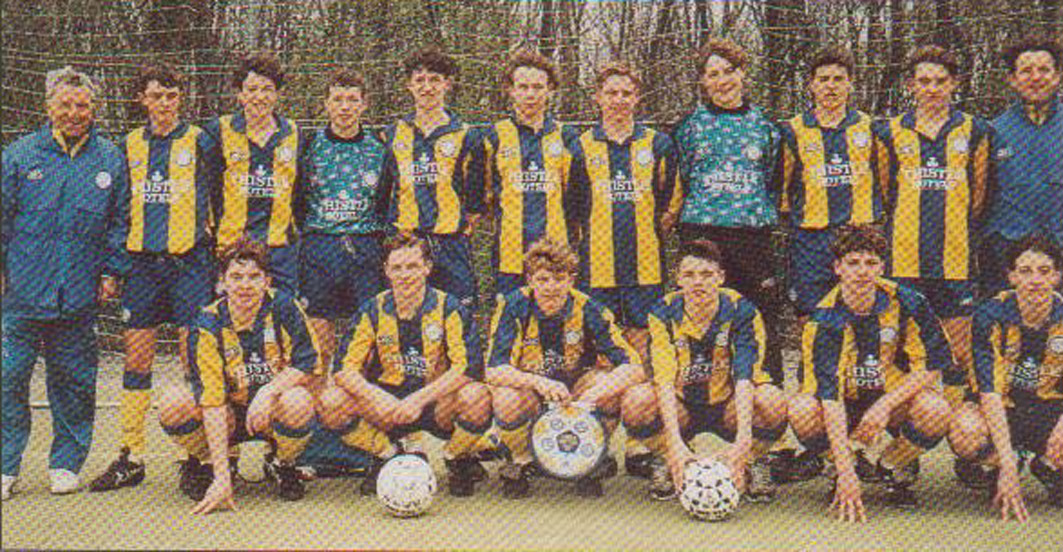
Back Row: Eddie Beaglehole (Coach), Kevin Trower, Lee Matthews, Kevin Holiday, Stephen Heath, Paul Shepherd, Danny Jacques, Richard Day, Lawrence Davis, Gavin Strachan, Andy Beaglehole (Manager).
Front Row: Jimmy Moody, Martin Foster, Mark Jackson, Simon Morgan, Ian Richards, Matthew Brown.
1995-96
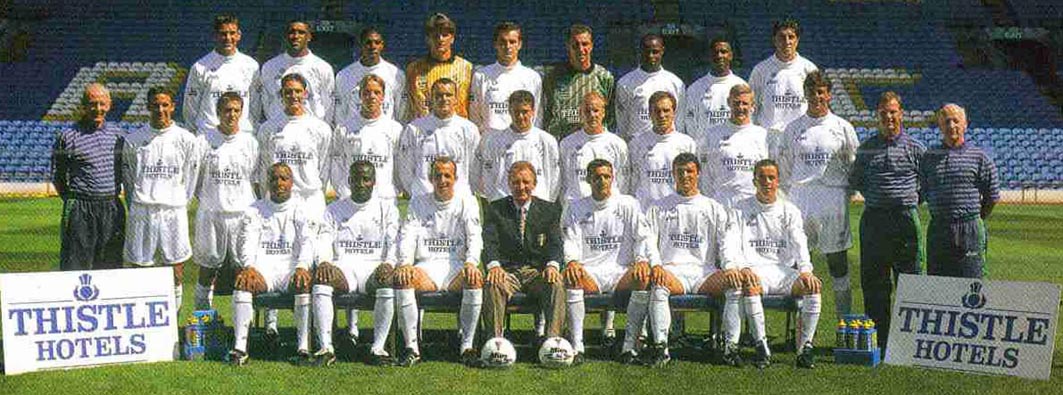
Back Row: David White, Brian Deane, Carlton Palmer, John Lukic, David Wetherall, Mark Beeney, Philomen Masinga, Lucas Radebe, Paul Beesley.
Middle Row: Mick Hennigan (Coach), Matthew Smithard, Mark Ford, Noel Whelan, Rob Bowman, Mark Tinkler, Andy Couzens, Kevin Sharp, Tony Dorigo, Nigel Worthington, David O’Leary, David Williams (Coach), Geoff Ladley (Physio).
Front Row: Rod Wallace, Tony Yeboah, Gary McAllister, Howard Wilkinson (Manager), John Pemberton, Gary Speed, Gary Kelly.
1995-96
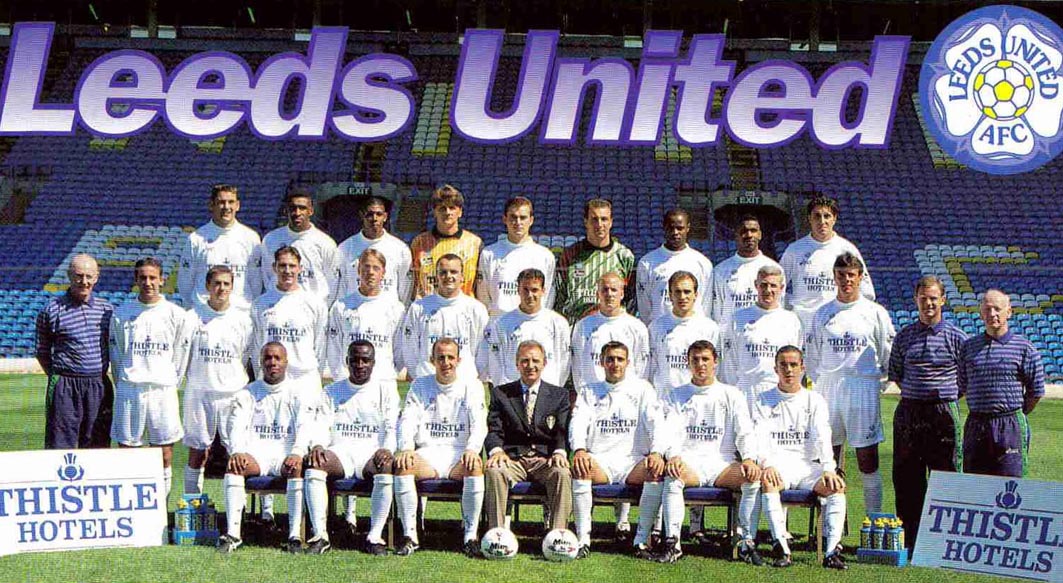
Back Row: David White, Brian Deane, Carlton Palmer, John Lukic, David Wetherall, Mark Beeney, Philomen Masinga, Lucas Radebe, Paul Beesley.
Middle Row: Mick Hennigan (Coach), Matthew Smithard, Mark Ford, Noel Whelan, Rob Bowman, Mark Tinkler, Andy Couzens, Kevin Sharp, Tony Dorigo, Nigel Worthington, David O’Leary, David Williams (Coach), Geoff Ladley (Physio).
Front Row: Rod Wallace, Tony Yeboah, Gary McAllister, Howard Wilkinson (Manager), John Pemberton, Gary Speed, Gary Kelly.
1995-96: UEFA Cup 1st Round At AS Monaco.
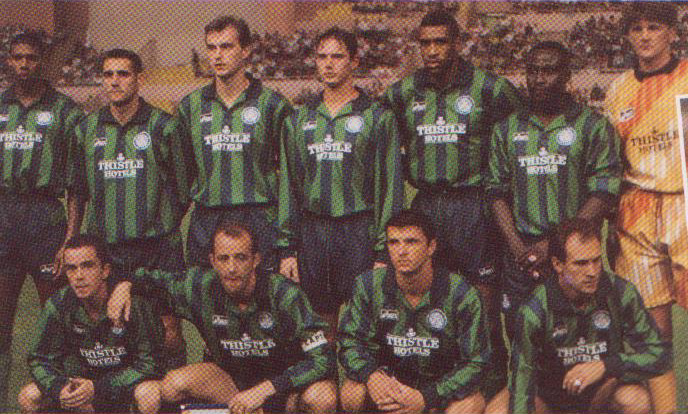
Back Row: Carlton Palmer, John Pemberton, David Wetherall, Noel Whelan, Brian Deane, Tony Yeboah, John Lukic.
Front Row: Gary Kelly, Gary McAllister, Gary Speed, Tony Dorigo.
1995-96: Juniors
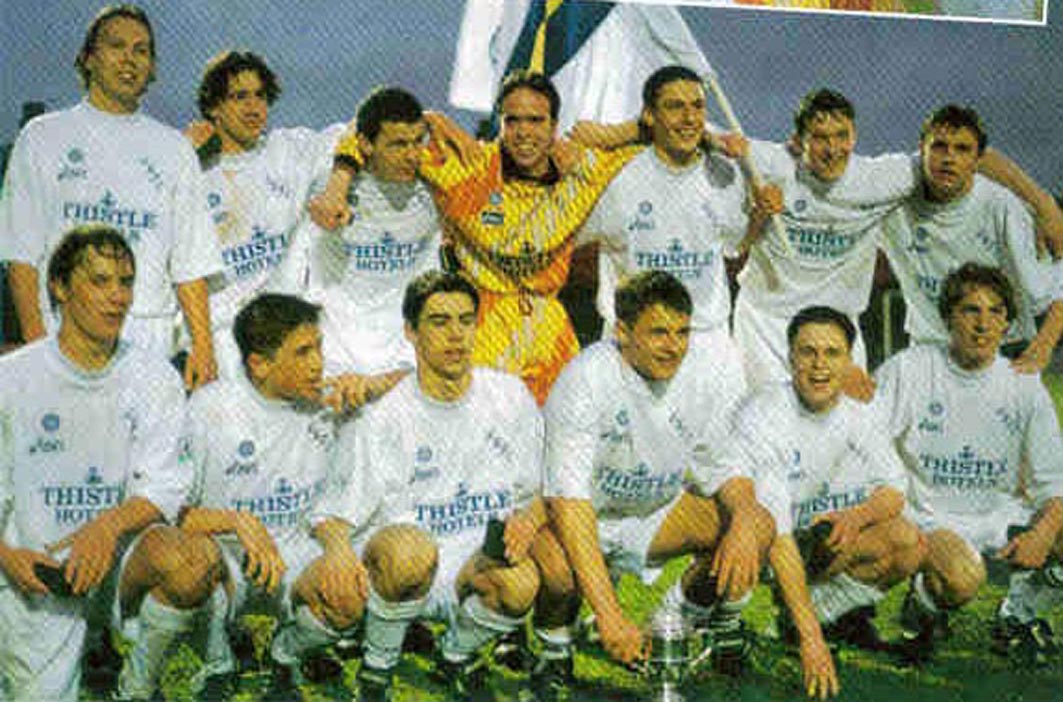
Back Row: Paul Shepherd, Jason Blunt, Ian Harte, Simon Briggs, Tony Hackworth, Lee Matthews, Stephen McPhail.
Front Row: Martin Foster, Harry Kewell, Damien Lynch, Mark Jackson, Alan Maybury, Wesley Boyle.
1996-97
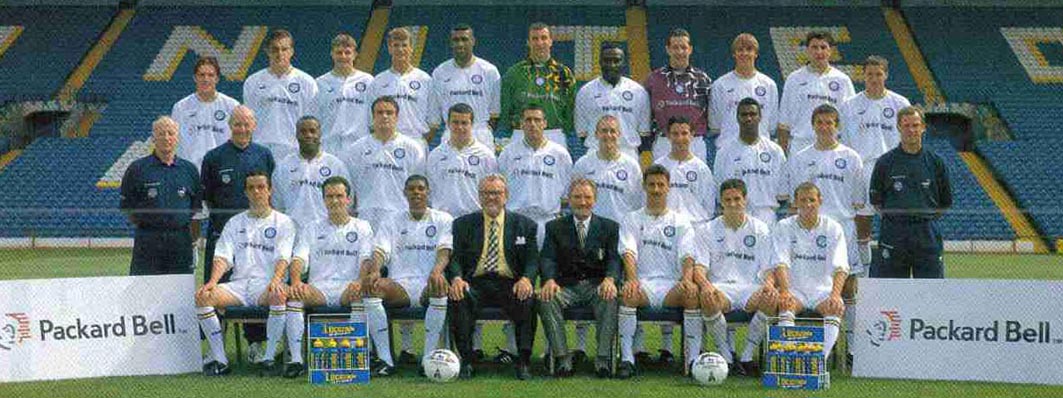
Back Row: Lee Sharpe, David Wetherall, Mark Jackson, Richard Jobson, Brian Deane, Mark Beeney, Tony Yeboah, Nigel Martyn, Rob Bowman, Paul Beesley, Andy Couzens.
Middle Row: Geoff Ladley (Physio), Mick Hennigan (Coach), Rod Wallace, Mark Tinkler, Ian Harte, John Pemberton, Mark Ford, Jason Blunt,Lucas Radebe, Harry Kewell, David Williams (Coach).
Front Row: Gary Kelly, Tony Dorigo, Carlton Palmer, Bill Fotherby (Director), Howard Wilkinson (Manager), Ian Rush, Andy Gray, Lee Bowyer.
1996-97: Pre-season Friendly at Grimsby Town 10-8-96.
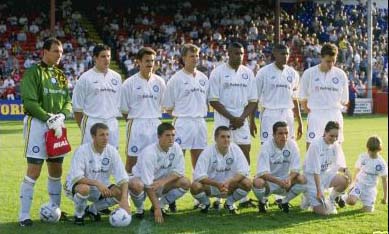
Back Row: Mark Beeney, Andy Gray, Ian Rush, Richard Jobson, Brian Deane, Carlton Palmer, Andy Couzens.
Front Row: Lee Bowyer, Harry Kewell, Mark Ford, Gary Kelly.
Players/Managers:
Howard Wilkinson: Manager, Micky Adams , Tony Agana , Mark Aizlewood , Ian Andrews , Jack Ashurst , Neil Aspin , Ian Baird , David Batty , Mark Beeney , Paul Beesley , Jim Beglin , Noel Blake , Jason Blunt , Rob Bowman , Lee Bowyer , Tomas Brolin , Eric Cantona , Lee Chapman , Andy Couzens , Bobby Davison , Mervyn Day , Brian Deane , Tony Dorigo , Neil Edwards , Paul Evans , Chris Fairclough , Mark Ford , Jamie Forrester , Andy Gray , Peter Haddock , Ian Harte , John Hendrie , Vince Hilaire , Steve Hodge , Mark Jackson , Richard Jobson , Vinnie Jones , Chris Kamara , Gary Kelly , Dylan Kerr , David Kerslake , Harry Kewell , John Lukic , Nigel Martyn , Phil Masinga , Ally Mauchlen , Alan Maybury , Gary McAllister , John McClelland , Peter Mumby , Jon Newsome , Chris O'Donnell , David O'Leary , Brendan Ormsby , Carlton Palmer , John Pearson , John Pemberton , Paul Pettinger , Lucas Radebe , David Rennie , David Rocastle , Ian Rush , Scott Sellars , Kevin Sharp , Lee Sharpe , John Sheridan , Carl Shutt , Glynn Snodin , Gary Speed , Mel Sterland , John Stiles , Gordon Strachan , Frank Strandli , Peter Swan , Bob Taylor , Mickey Thomas , Mark Tinkler , Chris Turner , Imre Varadi , Ray Wallace , Rod Wallace , David Wetherall , Noel Whelan , David White , Mike Whitlow , Chris Whyte , Andy Williams , Gary Williams , Nigel Worthington , Tony Yeboah .